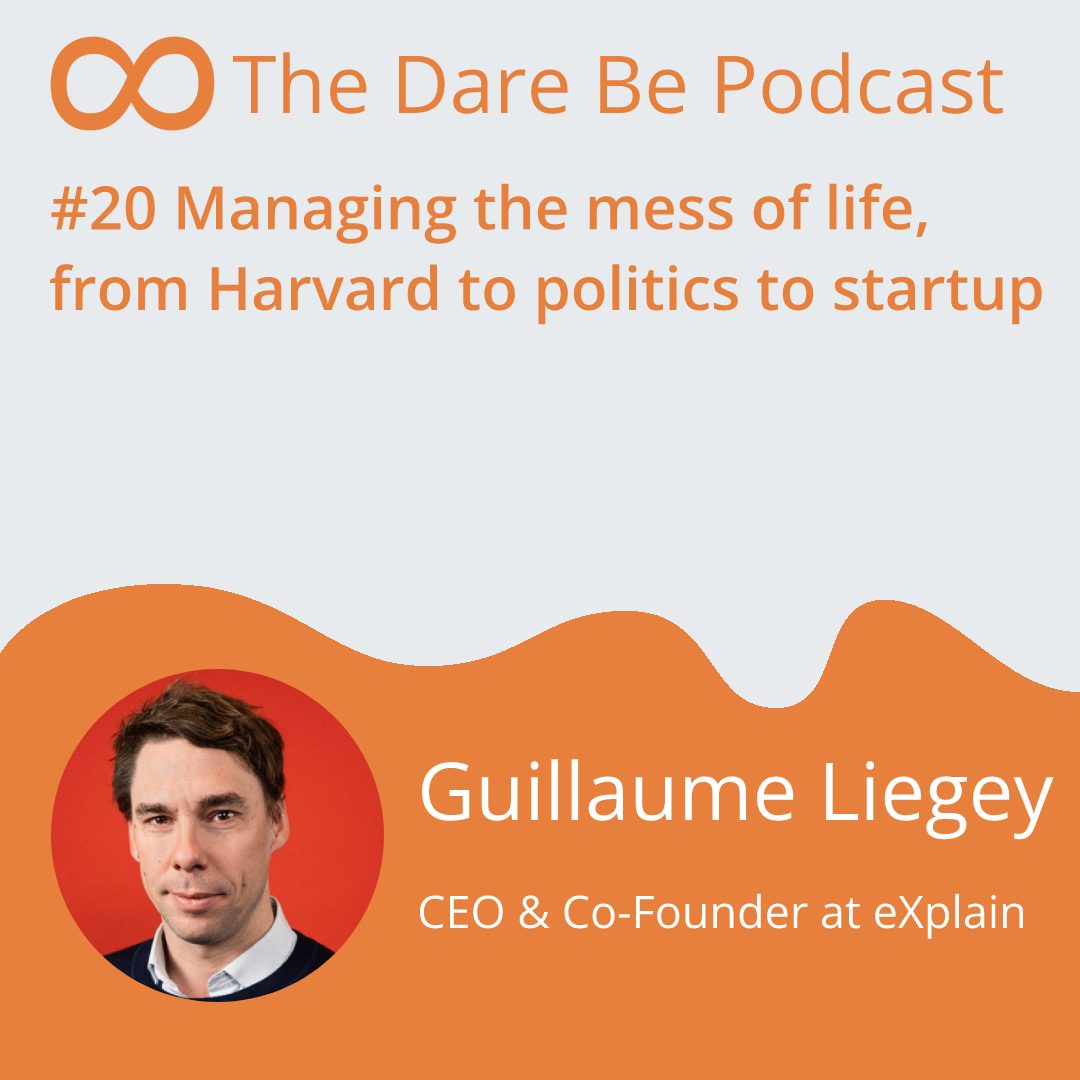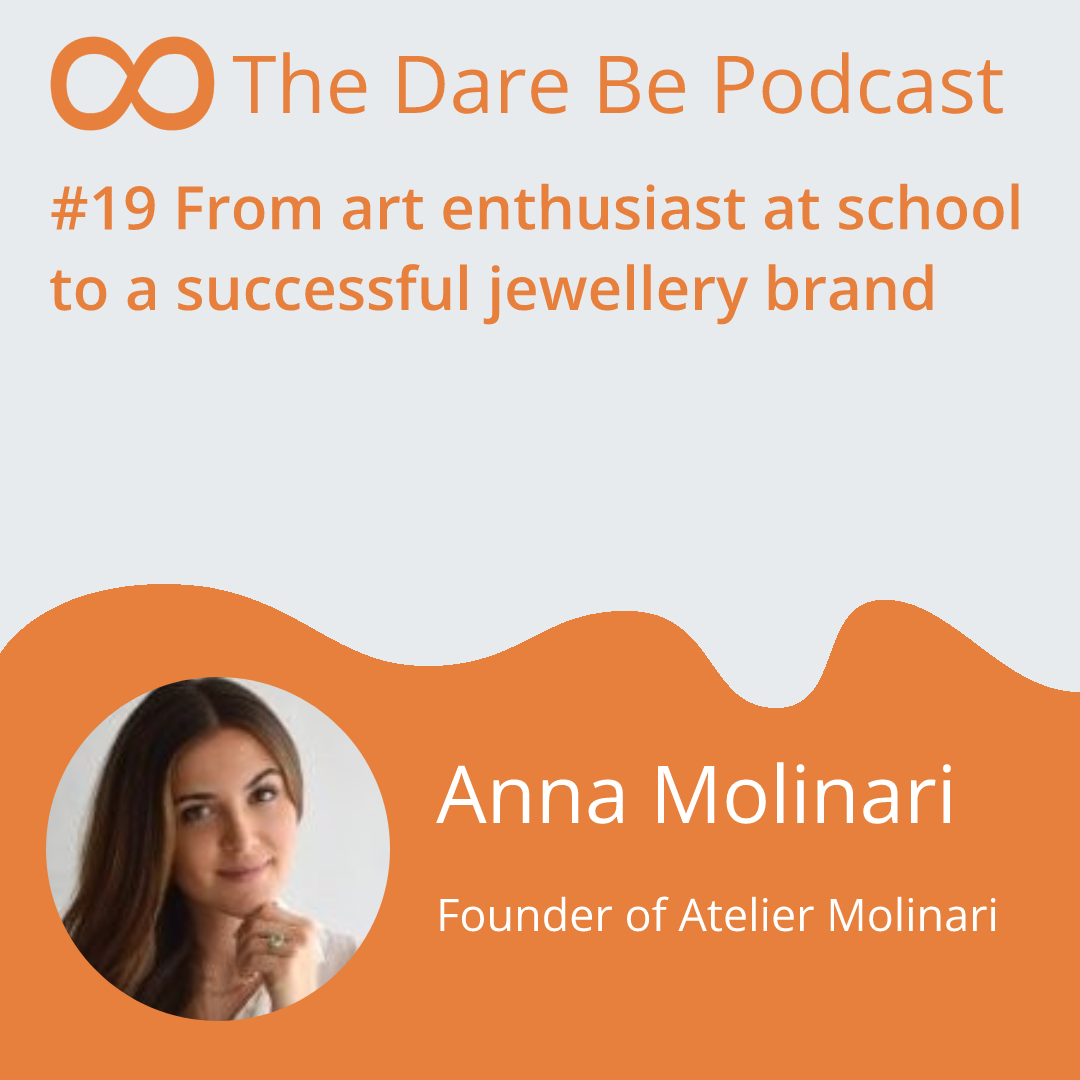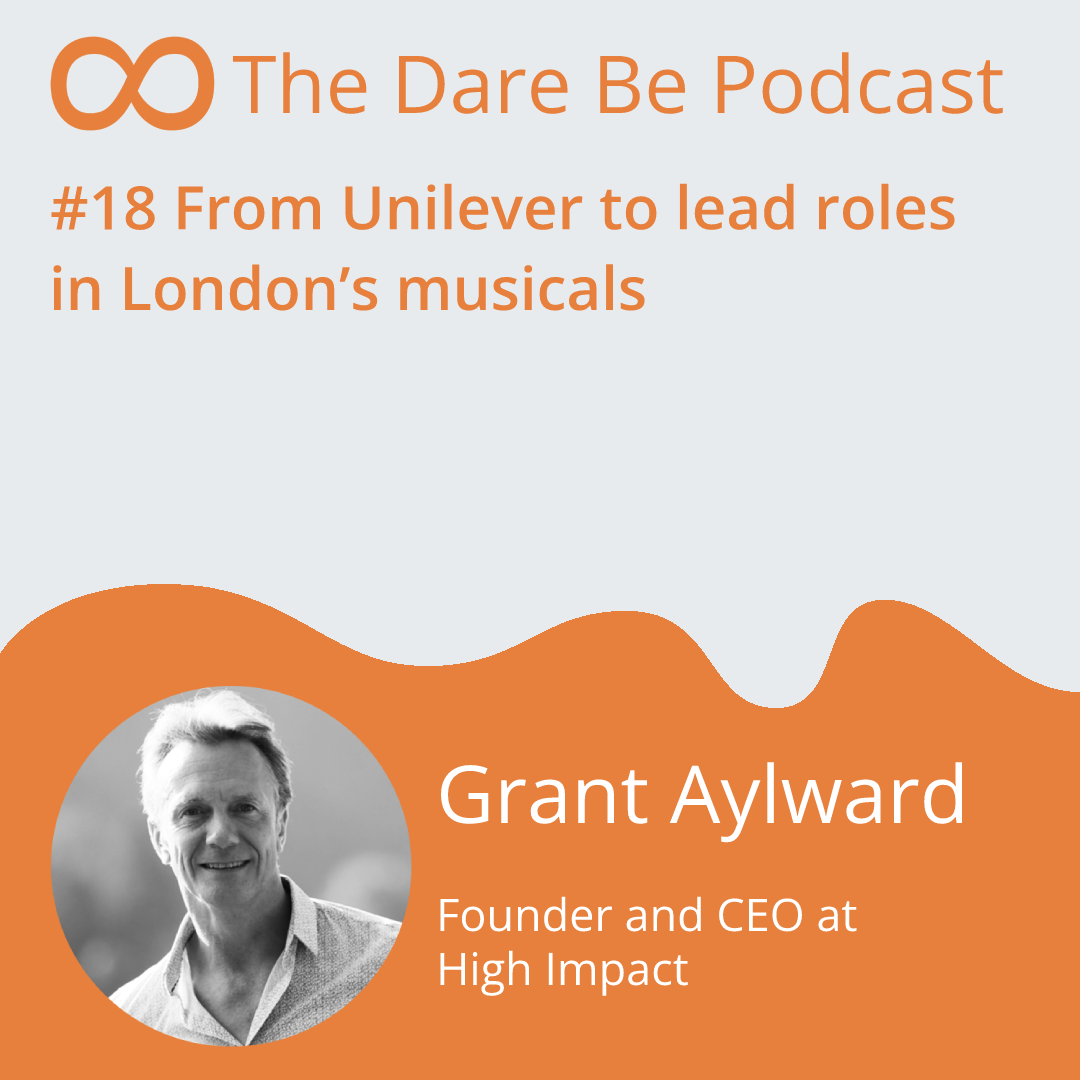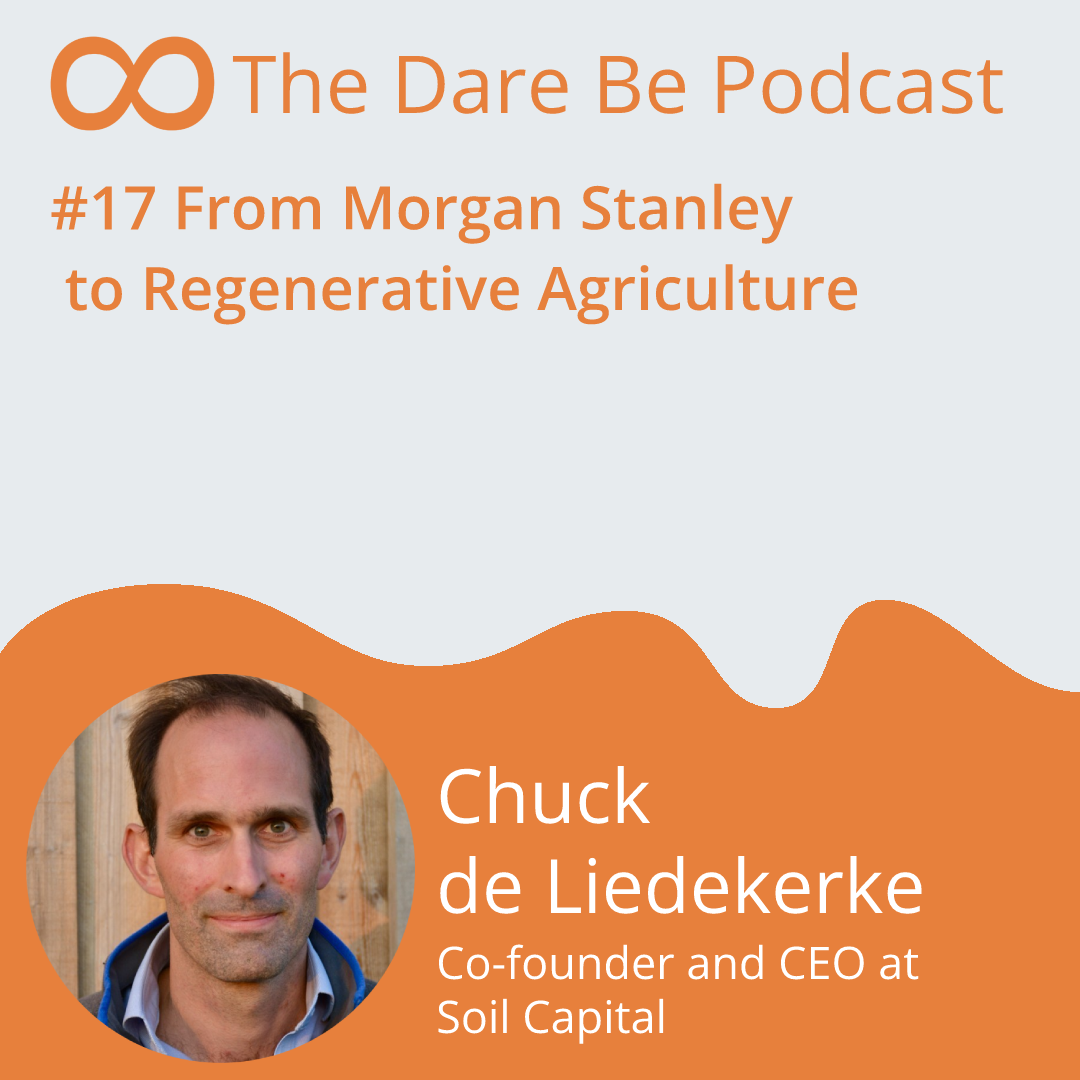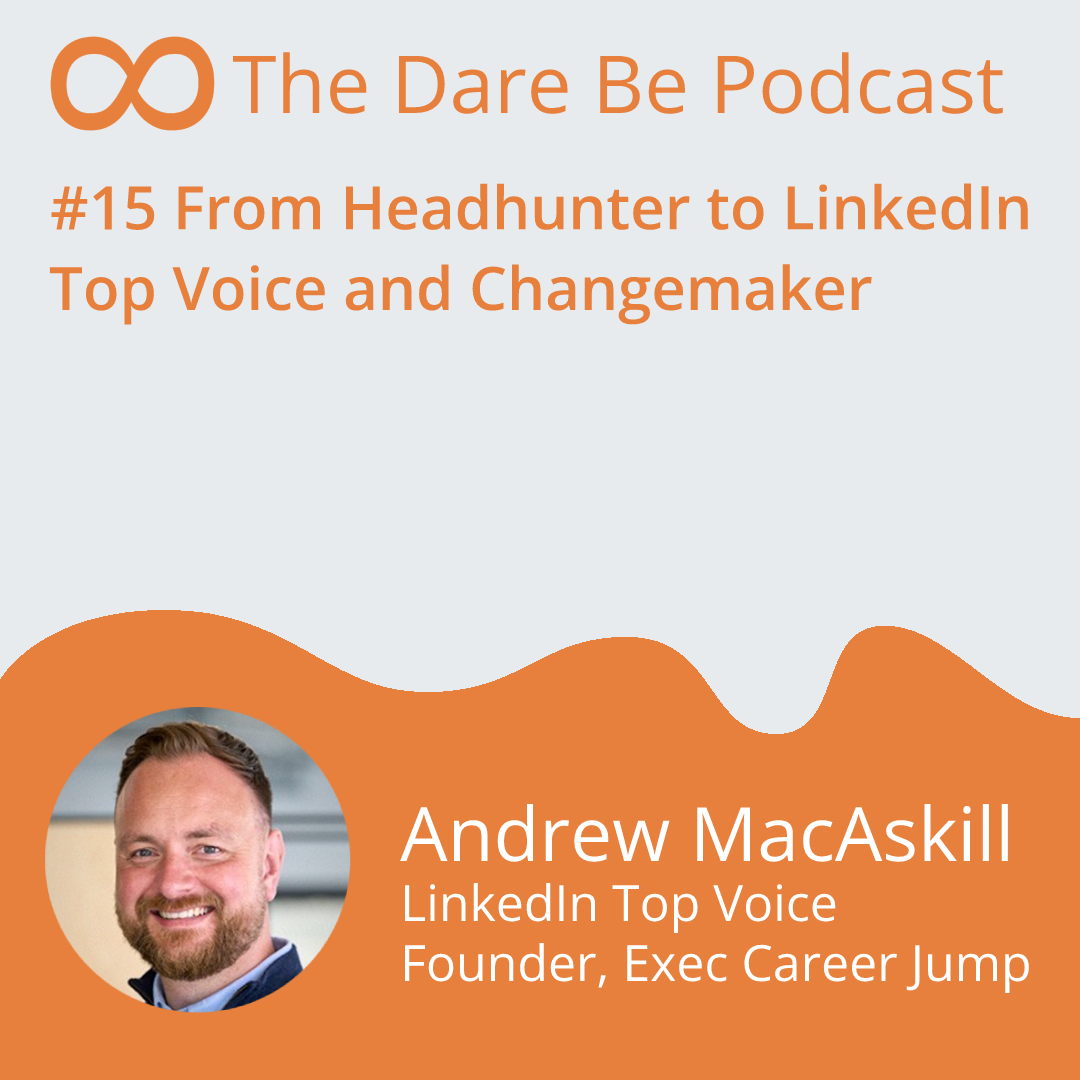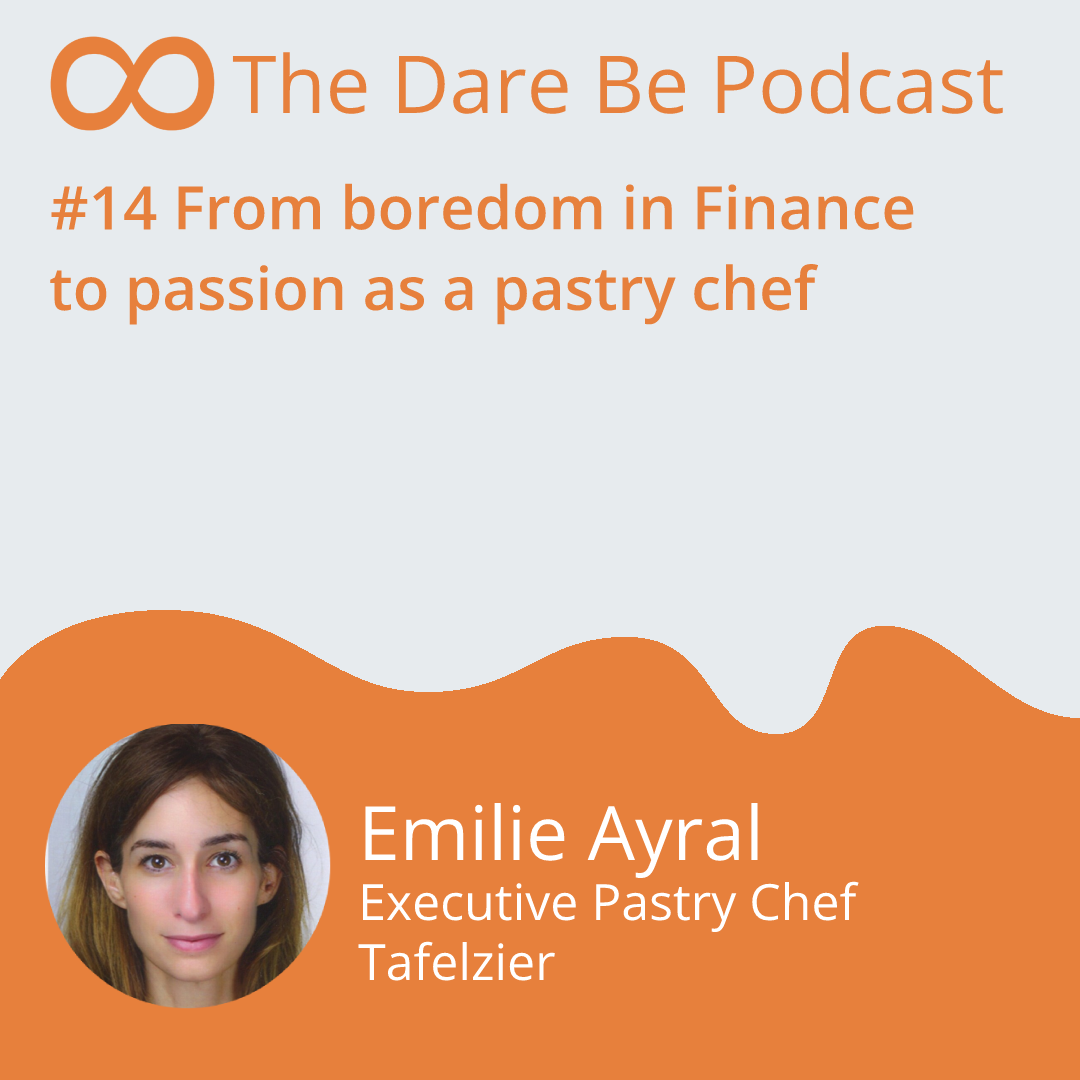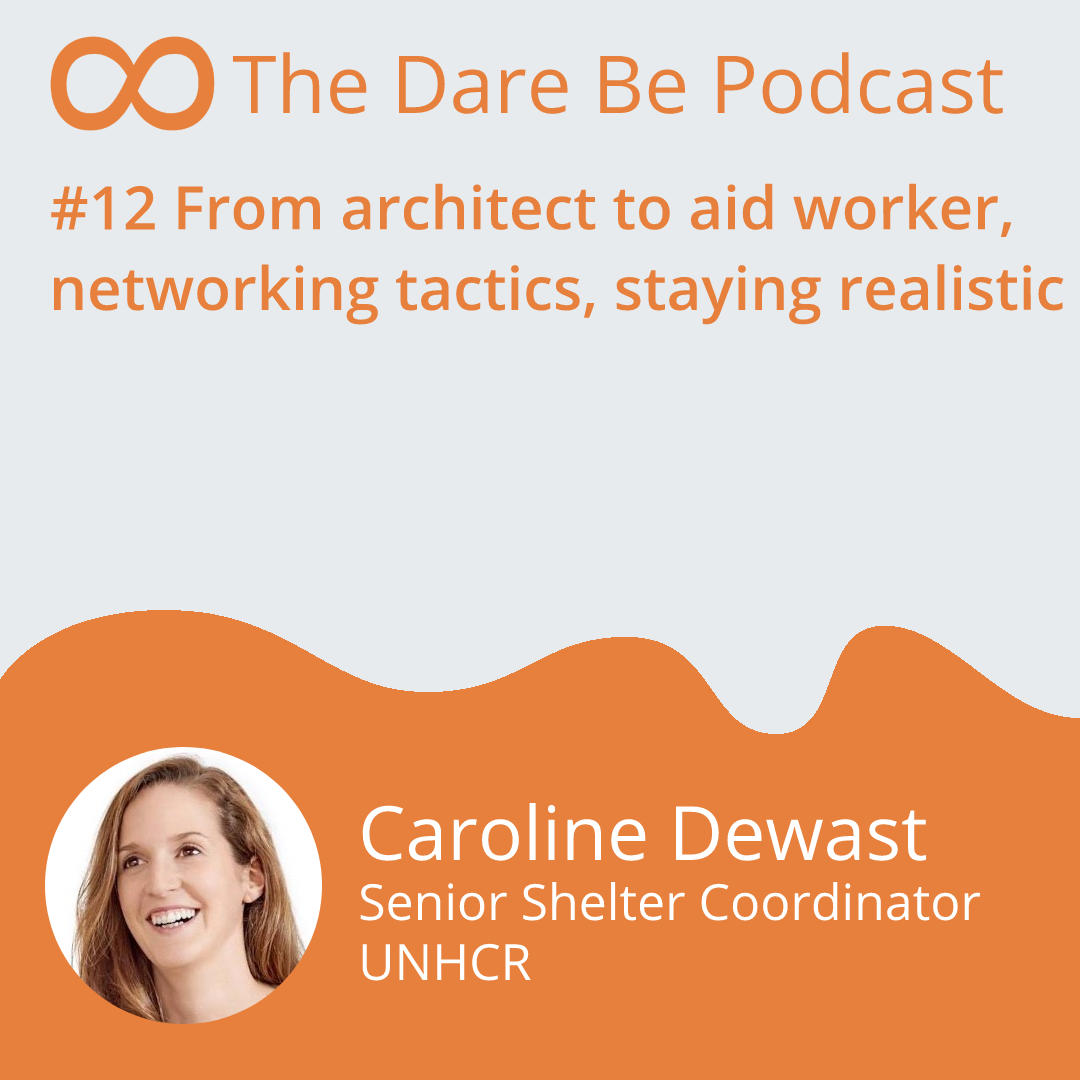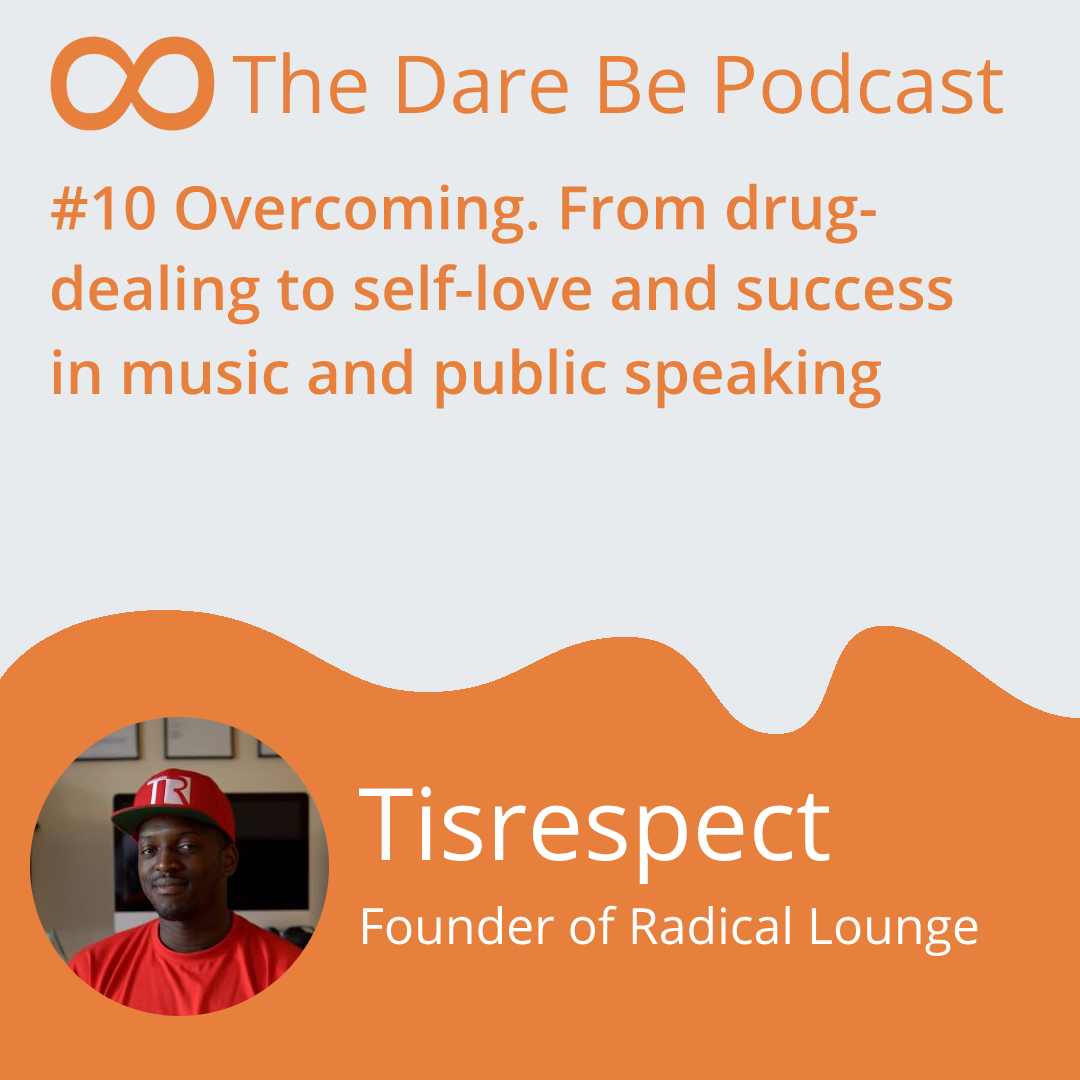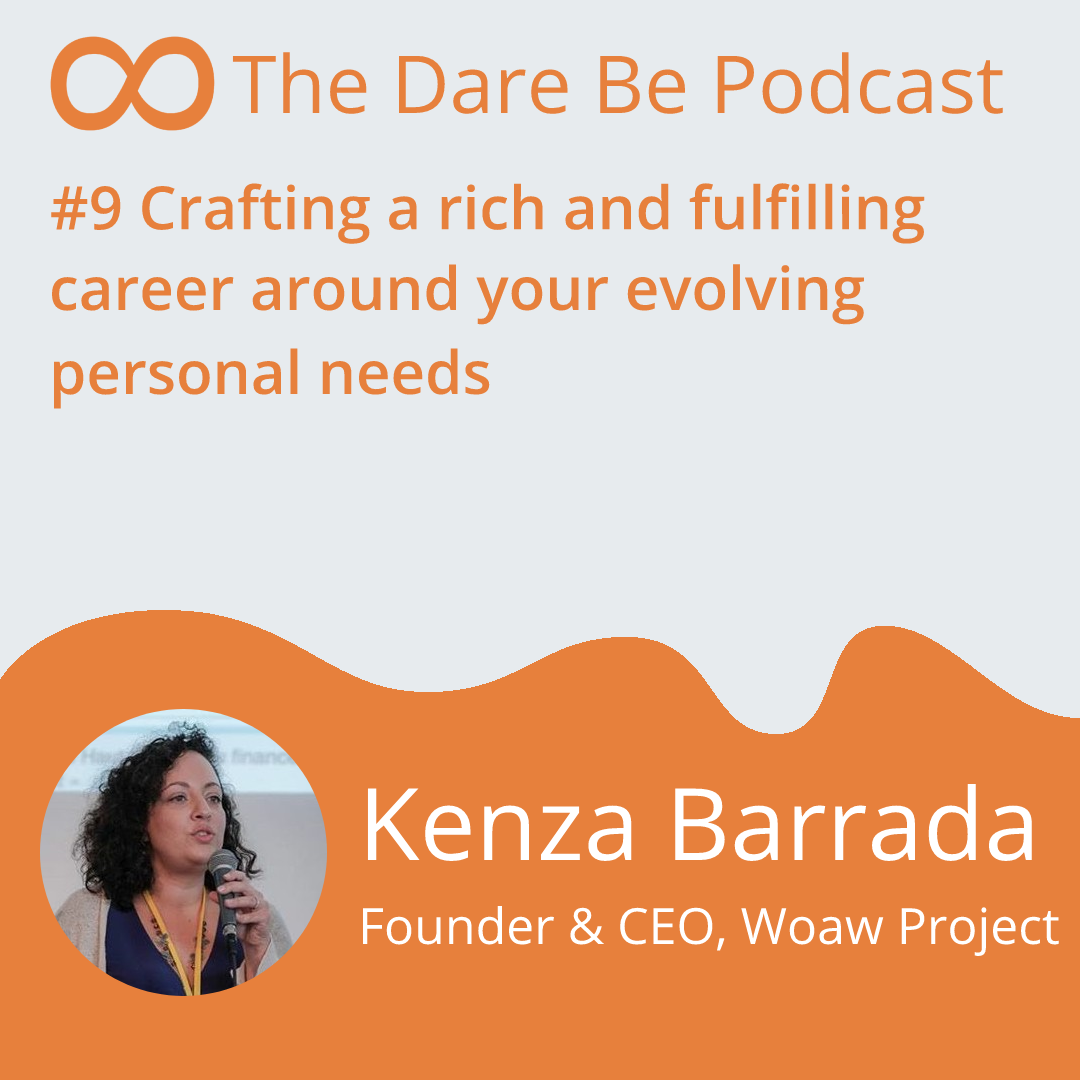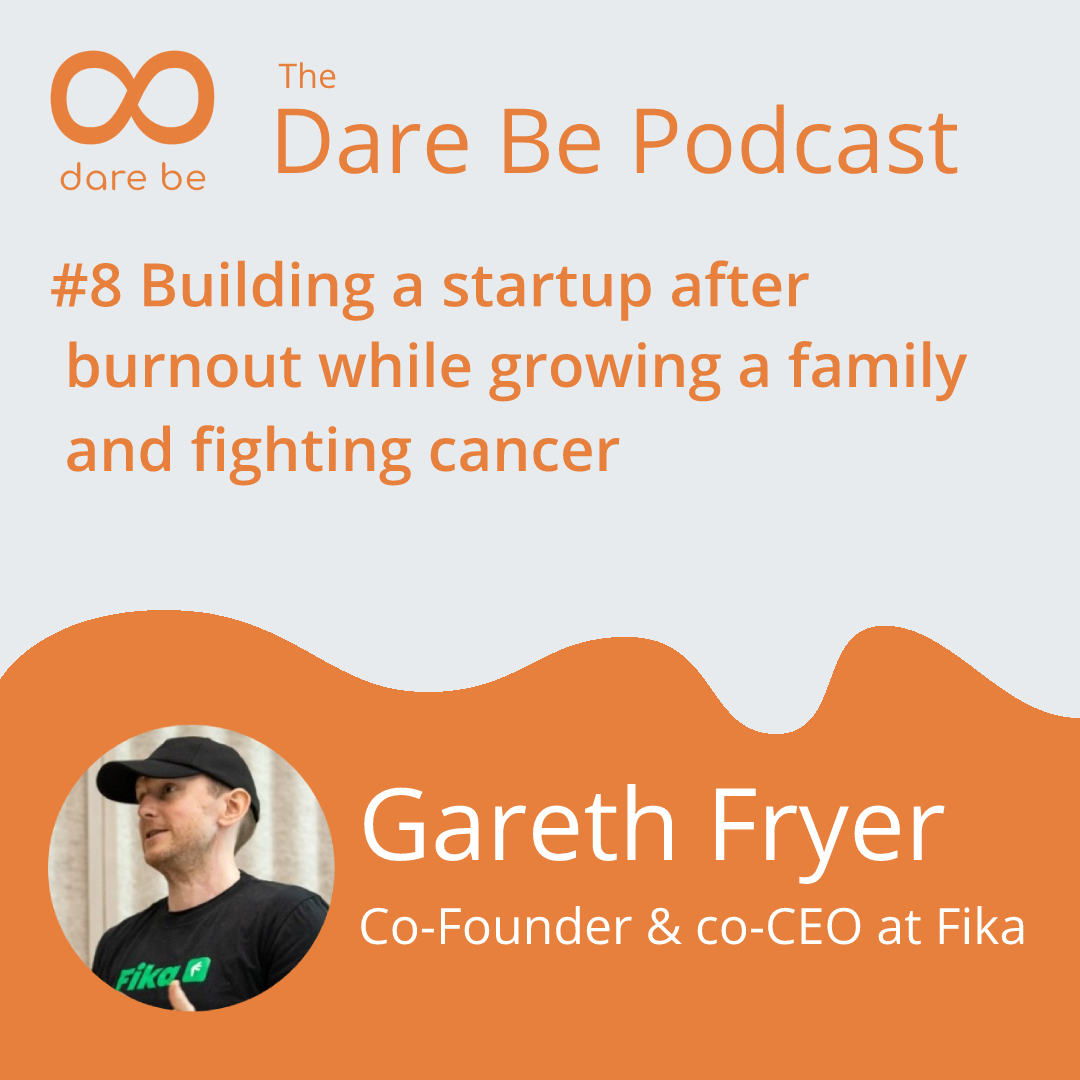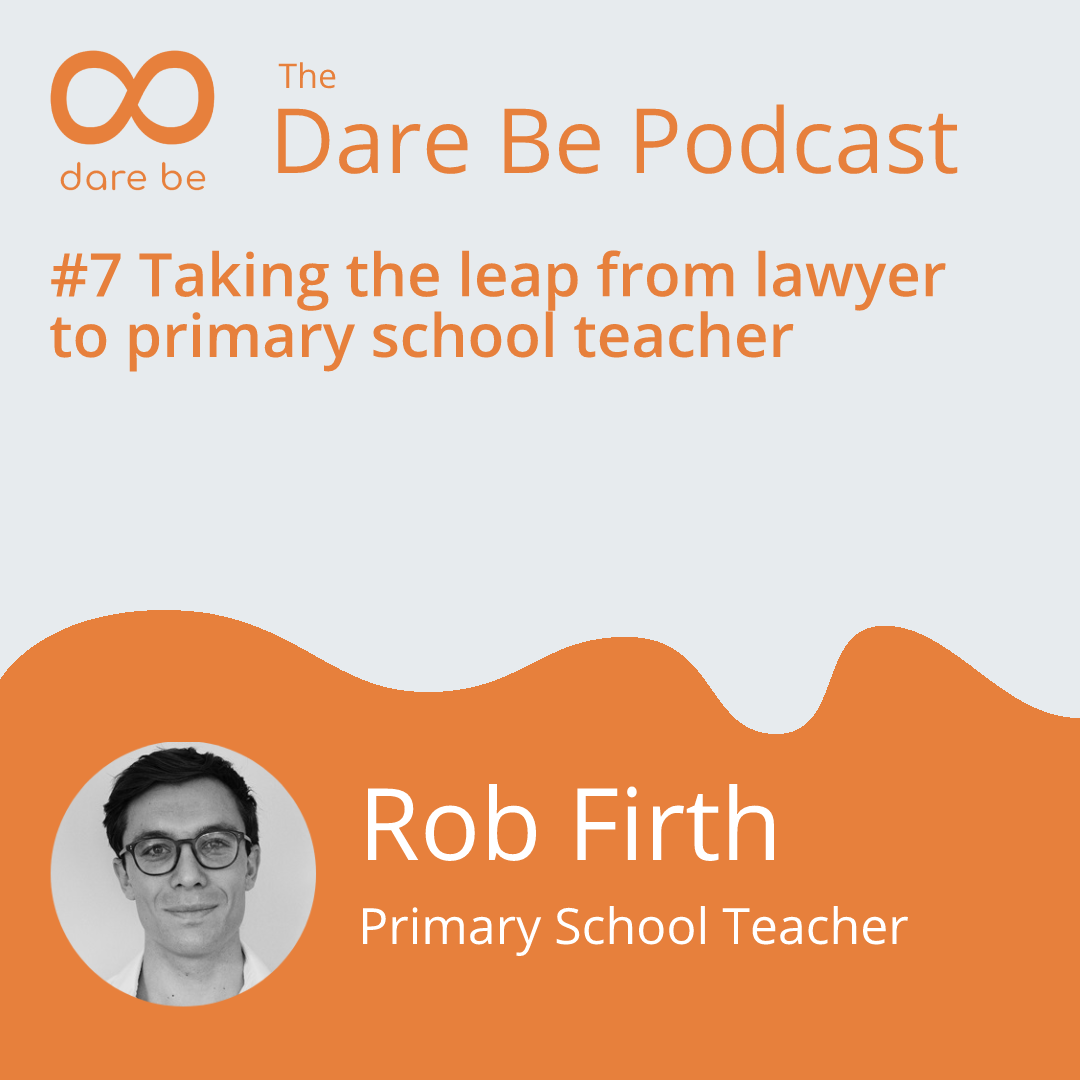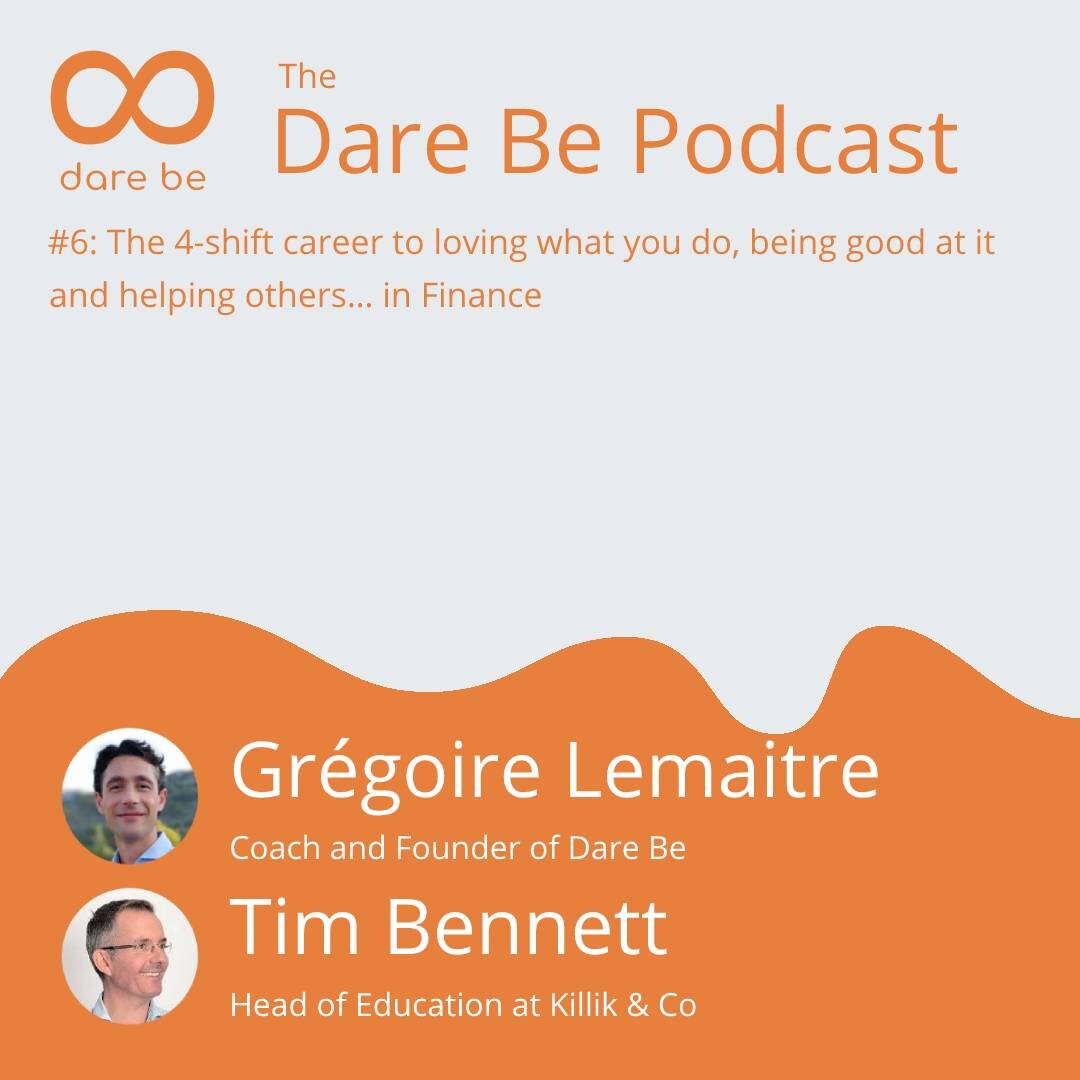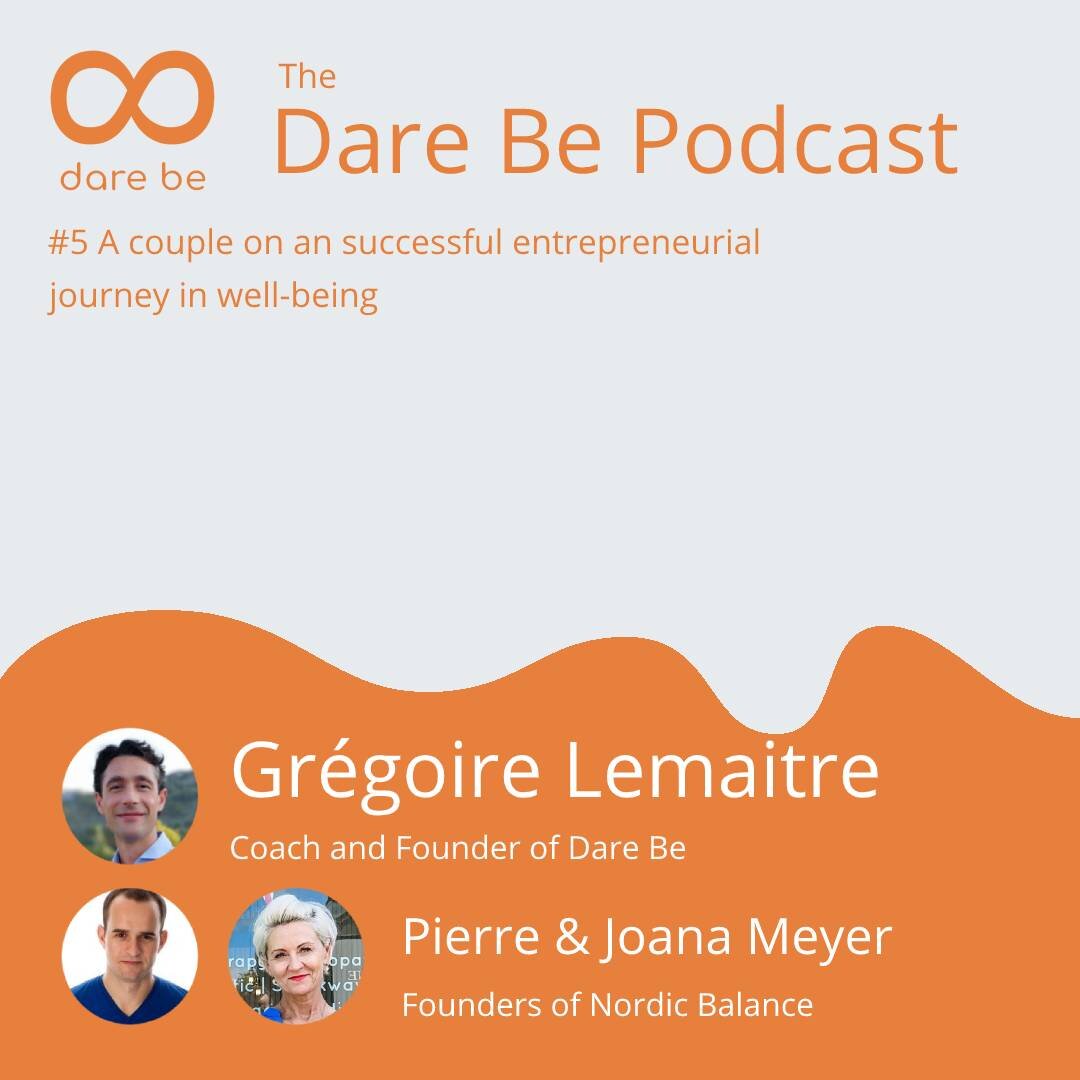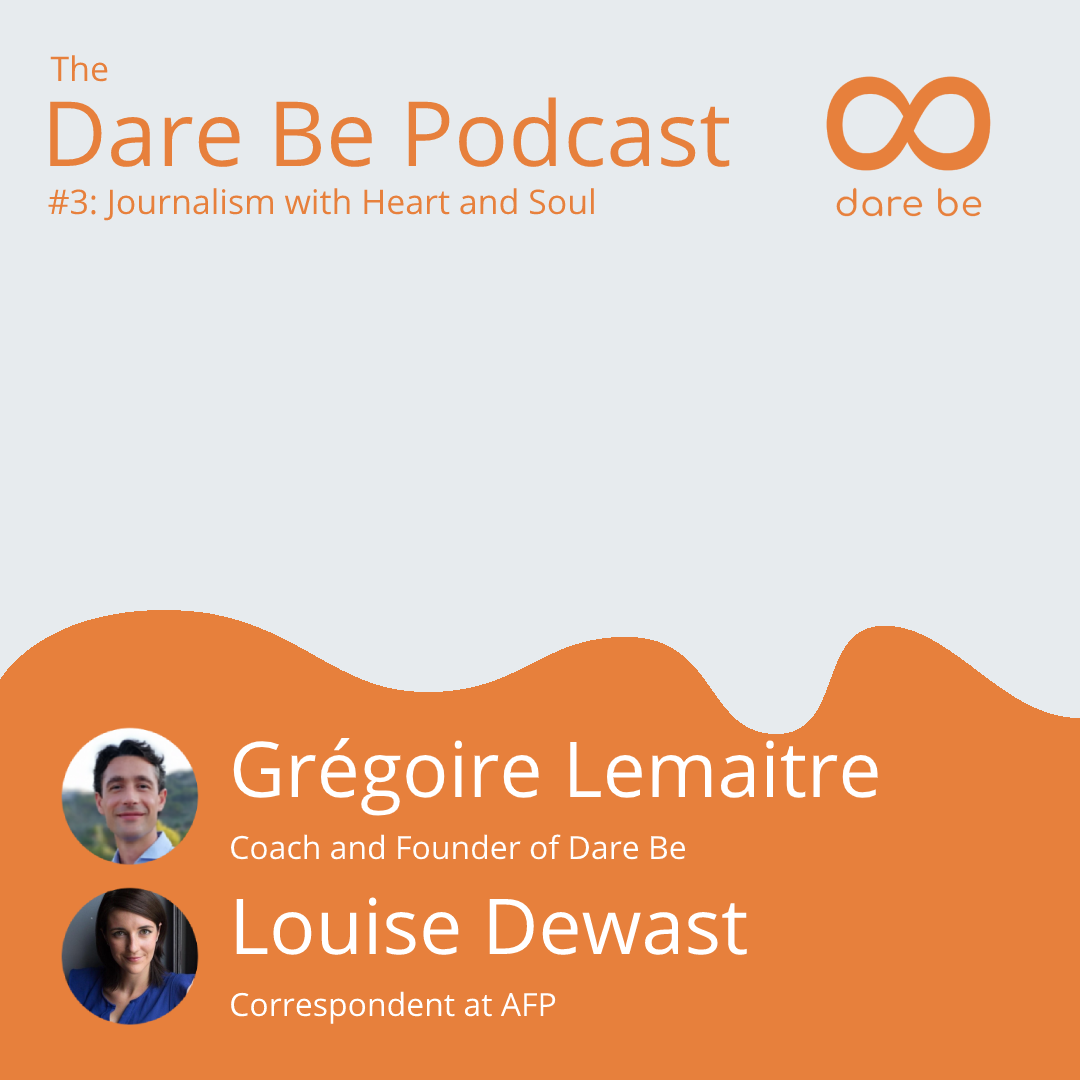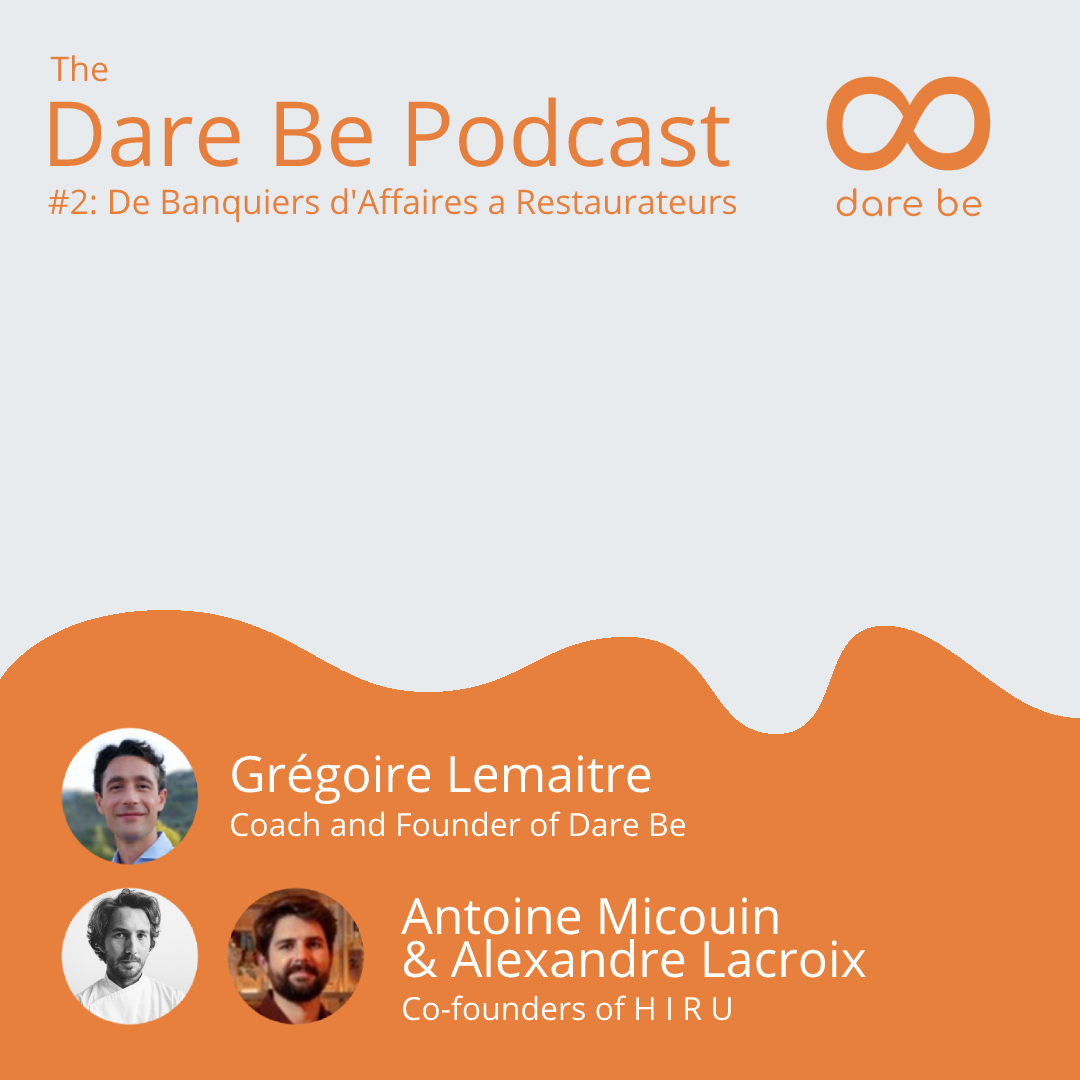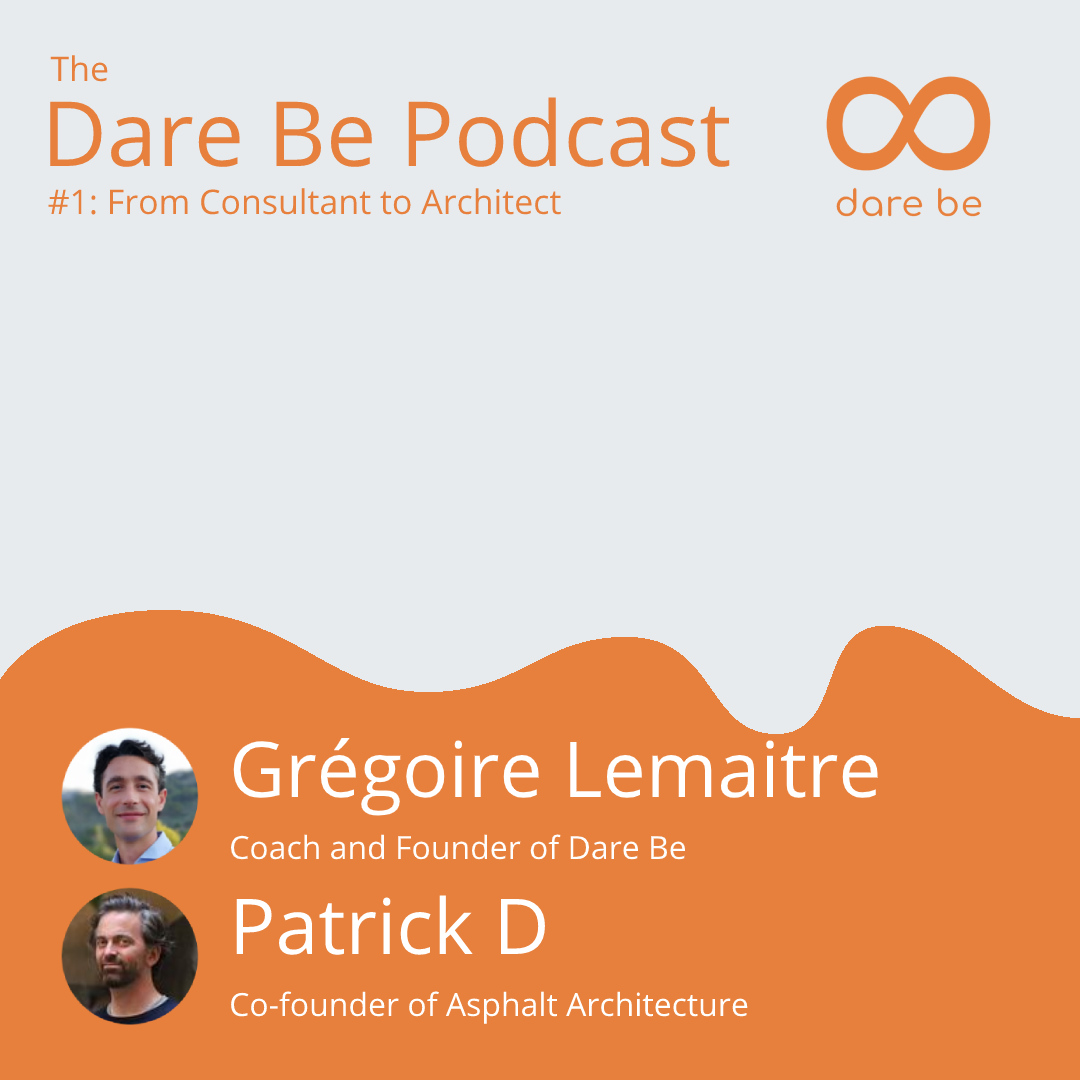Discover Dare Be Podcast
Dare Be Podcast

Dare Be Podcast
Author: Gregoire Lemaitre
Subscribed: 4Played: 6Subscribe
Share
Description
Get inspired by people who found fulfilment and joy in their career. Learn how they identified their vocation. Hear the courageous changes they made to follow their passion and purpose.
It is hosted by Grégoire Lemaitre who is on a mission to help people start on their own path to meaningful success.
A journey he has himself embarked on after 15 years in a career that had the usual markers of success but lacked purpose and joy.
Greg is a career and leadership coach. He co-founded Dare Be, which delivers the 6-week Find Direction Course (www.darebe.me/course).
19 Episodes
Reverse
A warm welcome to the Dare Be Podcast where I interview people who have followed their passion and mission.My guest in this episode is Guillaume Liégey, an entrepreneur. He co-founded eXplain, a startup to combine his passion for politics and his desire to work with great people.While at the Harvard Kennedy School, he witnessed how data-driven and field-focused Obama's campaign was. So he decided to bring back to France this best practice. He did it with the French Socialist party in 2012. He then worked closely with Emmanuel Macron to create and launch the En Marche party which won the French presidential election in 2017.Preferring to focus on his business he made the tough decision to withdraw from the campaign and to pivot the business.In this episode Guillaume also talks about the joys and struggles of being an entrepreneur, such as the many nos entrepreneurs have to receive in fundraising, about balancing ambition and ego, about learning humility as a Parisian consultant in a factory in Marseille and much more. I think you'll enjoy this conversation!
A warm welcome to the Dare Be Podcast where I interview people who have followed their passion and mission.My guest in this episode is Anna Molinari, founder of the jewellery brand Atelier Molinari. She shares the pivotal moments in her story of falling in love with art at school and being challenged for it; of the magical trip to the Gem Palace in Jaipur India when she instantly knew she was meant to become a jewellery designer; of the sacrifices she’s had to make for 6 years; of her long, underground learning journey through Jaipur, Paris, London and New York; of the crazy day when the buyer of one of the most prestigious retail stores in the world offered to sell her own jewellery creations. I hope you get inspired by her courage and determination to pursue her dream and make it happen. [00:03:32] Two things she loves most: drawing and picking stones [00:05:19] Getting in the zone of limitless possibilities when drawing rings [00:06:57] A ring is a like a little sculpture, unlike earrings and necklaces which move[00:07:37] Her first rings were made of cigarette packs and the metal piece holding champagne corks [00:08:10] The story of her first ring that also started the design of her entire collection [00:09:56] Exploring the idea of creating lace out of gold in her art studies at Central Saint Martins [00:11:25] Selecting stones: like being a kid in a candy store [00:12:57] The jewellery industry is all about trust[00:15:46] The emotions stones can generate[00:18:00] The start of her journey: made to feel not good enough at school except in her Friday afternoon art lessons[00:18:49] Anna:"I wanna do art. That's what makes me feel alive!" Headteacher:"This is a big problem."[00:19:47] Getting her parents' support[00:21:05] The power of having people believing in you[00:21:24] Preparing her portfolio was the first time she enjoyed working [00:21:47] Being surrounded and inspired by people who want to make it through their passion [00:23:35] The enchanted encounter with the world of jewellery in India [00:24:43] Jewellery for the exploration and enjoyment of it [00:25:58] The gentle arm twist of a famous jewellery designer to have her move from New York to Jaipur, India[00:27:04] Selling a necklace of muscle-like diamonds to Diane von Furstenberg[00:27:44] Making the scary move to Jaipur[00:29:22] Living in the enchanted Jewellery world and in simple conditions far from her family [00:30:52] First move out of India to Paris: hated it[00:31:30] Who can hire me to stay in New York and see the upcoming Met's jewellery exhibition? [00:32:04] Next steps in Paris, London, New York, India: who can teach me import? Client relationships? Invoicing?[00:33:02] Her 6 year project to launch her brand [00:33:40] The moment Bon Marché's buyer in Paris wants to work with her [00:34:45] Disbelief, fear of failing and ... calling for help[00:36:44] Struggling to sell her own creations (I relate!) [00:37:32] Selling stories instead of her creations[00:38:39] Crushing through Bon Marché's secret target and being called by Fortnum and Mason[00:39:49] The 6-year struggle with no option but to continue[00:40:49] Believing in the value of work that matters to you[00:41:17] Being part of the engagement stories[00:42:03] Her most expensive versus the most valuable piece of jewellery she's held[00:43:33] The art of celebrating and giving[00:44:20] Learn from every single experience!
In this episode I talk to Grant Aylward who, after a successful sales career in the consumer goods industry, decided to become an actor in London’s West End. It’s been a long journey and he made it all the way to getting lead roles in major musicals such as Mama Mia. Grant also used his experience as an actor to help business people communicate more effectively. This led him to found High Impact, a leadership and communication consultancy. He then gave up his acting career to dedicate all his attention to the business. I really enjoyed my conversation with Grant and I hope you do too! SHOW NOTES[00:01:45] What Grant does: CEO of High Impact a leadership development consultancy[00:03:33] High Impact is about helping leaders peel off layers to get to emotional connections[00:06:14] Like in acting, what matters in any interaction is the emotional connection that it creates[00:07:26] The actor's journey: getting as close to the truth of your character by getting under his skin [00:09:06] The importance of the spiritual dimension in leadership: leaders need to know why they are doing what they're doing. [00:09:45] His mission: enable leaders to be all that they are, all that they have been and all that they can be[00:11:09] Your emotional state as a leader determines your impact in your interactions - how can you shift it? [00:12:16] Many leaders believe managing employees' emotional states is none of their business. They are wrong. [00:13:42] His experience of becoming aware of his need to shift his emotional state[00:17:52] The adventure that helped him shift his emotional state from grumpiness to clarity and determination[00:23:43] The moment he deeply connected to what was important to him and had a dream vision of acting in London's West End[00:25:35] Aligning with his wife before making his career jump[00:26:45] Signs of the universe? His first child was born the day he graduated from Guildford Drama School - after struggling to conceive [00:27:47] His actor's journey to reaching his dream of playing in London's West End, singing "tell me it's not true"![00:29:16] Being determined to achieve your dream is just the starting point - accepting help along the way is also necessary[00:30:43] It's when he let go of trying to be a star that success emerged[00:31:14] Proving his father he could be creative was a driver in his journey[00:31:33] His actor's journey destroyed many beliefs: the sense of one's own importance[00:32:07] Auditions are a powerful opportunity to learn to deal with rejection[00:34:12] Hitting a crossroads in his acting career when he was offered the lead role in Mama Mia's world tour[00:35:11] How he got fired by his agent [00:36:25] How he decided to focus on the world of business using his hybrid experience [00:38:57] The exploration to understand what Charisma is made of and how to develop it through human qualities[00:40:43] His biggest lesson from his journey: standing up to something that you believe in [00:41:16] What's been most rewarding? Seeing others become their powerful selves[00:42:04] He grew the most when his 10-year old daughter allowed him to be himself with his new wife's children[00:43:41] Among the people who've inspired him most is Renault's chairman Jean-Dominique Sénard[00:46:14] Practical ways to shift your emotional state to create emotional connections [00:47:56] What may appear as him plugging his business in the conversation was actually plugging himself and what matters to him!
In this episode I talk to Chuck de Liedekerke, an investment banker at Morgan Stanley in London turned entrepreneur in regenerative agriculture . I enjoyed learning about regenerative agriculture, how it is a solution to climate change and the difference with organic agriculture. SHOW NOTES[00:02:21] What gives him the most satisfaction in his job? The team, the impact and making an idea successful[00:04:05] Regenerative agriculture versus extractive agriculture[00:06:04] There is no trade-off between environment and profit[00:07:04] Farmers' methods follow the food we buy[00:07:57] How regenerative agriculture helps to reduce carbon emissions and enhance resilience in our food system [00:10:20] How he focused on solving climate change in the first 9 years instead of solving problems for the real agents of change: the farmers [00:11:08] The difference between regenerative agriculture and organic agriculture[00:12:47] When he walked into his boss office to quit and he said "Sure, life's too short, but ask yourself this one question: What do you want to do?"[00:14:00] It felt good not to know what he wanted to do[00:15:09] The Ted Talk binge to answer the question[00:16:08] The Ted Talk that clicked everything into place[00:18:33] The many happy coincidences as confirming signs[00:19:30] Saving the world and making money scales and can last[00:21:36] The calling for creating an operational relationship with nature[00:22:52] It took him 1.5 years to actually resign[00:23:34] Looking for a business partner who actually knows this stuff[00:25:07] The first business idea that never happened: create an investment fund [00:27:44] The emotional ride of the beginning [00:28:42] Doubting the business model and adapting but never doubting the regenerative agriculture focus[00:29:34] The first investment opportunity that made them pivot away from investing[00:30:25] From land investors to farmland managers[00:31:41] Learning and then looking to scale their knowledge and impact [00:33:17] From feeling free and pivoting to committing to a plan and a team of 28[00:37:03] Acknowledging his weakness and looking for people to compensate for it[00:38:06] Didn't create the business with friends, became friends through the business[00:38:37] Inspired by Patagonia's founder for working for a purpose[00:40:25] Importance of religion - leaving every room better than when you arrived[00:41:21] His most important lesson? Love to be wrong, to capture what's true around you[00:43:21] His greatest reward: having built a team that would function without him[00:45:25] The power of vulnerability at work[00:46:16] Biggest challenge? At the beginning the lack of credibility, today the pace of change in science and policy [00:47:16] If you're not tackling the world's meaningful and urgent problems, you're part of the problem I also really enjoyed listening to his story. From the evening when he walked into his boss' office to quit to now as CEO of a business with 28 people... A LOT has happened. I was struck by his self-awareness and humility. There are important learnings for all of us. I hope you enjoy it!
Bruce Daisley is the author of the Sunday Times best seller The Joy of Work, host of the number 1 business podcast eat sleep work repeat, a workplace culture expert and an award-winning speaker. He used to be the most senior employee at Twitter outside NA. He worked at Google where he ran YouTube in the UK.I wanted to talk to him because I like the work he does and his takes on workplace culture and also because I was interested in his journey from media and Big Tech to what he does now. I hope you enjoy my conversation with Bruce where he shares insights into what makes a high-enjoyment and high-performance work culture. You will also hear about his transition, writing a book and launching a podcast while having a high-profile role in a fast-paced organisation like Twitter.SHOW NOTES[00:03:20] How come big tech companies still don't know how to adapt to a hybrid approach to work [00:04:48] You can never "nail" the culture in a company [00:05:14] Leaders embody what's acceptable and what's not acceptable in a business. They create the identity of the team and the critical sense of "us". [00:06:28] The missteps Uber took in building their culture was may have been the reason they have been so successful [00:09:00] The myopia of feeling like you have a good culture because it fits you[00:09:16] How the work hard play hard cultures can be exclusionary[00:10:56] How he tried to create an environment where people would say this was their favorite job [00:12:21] How understanding what makes cultures tick became his obsession[00:12:47] How he became a popular podcast host and came to write a book on culture [00:13:13] What made him jump from top job in Big Tech to become a podcaster, writer, consultant[00:15:08] What are the symptoms and causes of burnout?[00:17:16] Our fear system operates in direct opposition to creativity[00:19:39] How the tyranny of email and meetings prevents organisations to tap into the creative power of their people[00:21:10] Why many companies are looking at their middle-management to create differentiation in a world where hybrid is the norm [00:22:27] Calling out the important part of luck in making his career a success[00:23:23] What his experiences as a barman and working in fast fod restaurant taught him about the workplace [00:24:32] How he created a "student union bar" culture within the prevalent "consultant" culture at Google[00:26:47] How fun became a way for him to make time pass by faster in his low-paid jobs[00:27:50] How to make playfulness the driver for high-performance[00:29:47] How laughter can be a powerful coping mechanism to deal with great difficulty[00:30:40] How your sense of connection to your team and the strength of your support network helps you deal with trauma [00:32:49] How growth mindset is a charming theory but not backed up by research [00:34:21] How a sense of togetherness generates resilience, like in Ukraine now [00:36:55] How companies can promote a sense of connection by creating a diverse set of communities [00:39:15] What's been most rewarding on his journey? Regular moments of laughter[00:41:08] What's been most challenging on your journey? Bad and new bosses.
Listen to the story of Andrew MacAskill, a LinkedIn Top Voice. He is also part of LinkedIn's Changemaker Programme set up to help make work a better place. Andrew is also the founder of Executive Career Jump, a career coaching company with the mission of ending career-based misery. In the past two years, he's worked with over 500 people to help them find jobs that are more aligned with who they are. Andrew's mission is complementary to what I do: as a career coach I help people clarify what they want to do, Andrew helps on the critical step of helping people get the job they want. We first talk about the state of the workplace, the role LinkedIn is playing in this and then we dive into his story. You will learn about what it feels like to lose one’s job, about what it takes to become an influencer, about starting a passion project as a side hustle and making it your main income, about leveraging LinkedIn when you are job-hunting or recruiting.
An emotional conversation with Emilie about her passion for food, about her childhood memories cooking with her grandmother and about her challenging and successful journey to pursue it. Emilie changed her career from being in Finance in Paris to working in the food industry. She's now the pastry Executive Chef in a luxury gastronomy brand in Germany. She explains how her love for food was transmitted as an heritage from her grandparents in her family house in the South of France. She also explains what makes a perfect pain au chocolat. And of course she tells the story of her transition. She shares what she called her revelation that she got while attending a class at the famous Ducasse school. How she quit her job to become a pastry teacher herself, the difficulties she had to overcome and the years it took to clarify how she could do what she really wanted to do in food and in pastry. SHOW NOTES [00:02:34] Grew up in a family where every meal should be a celebration[00:03:21] Her emotional memories of the preparations and the meals with her grandmother and grandfather [00:04:39] How she cooked with her grandmother recipes elaborated by her great-great grandmother[00:05:44] Growing up tasting all the different flavours, products given by her grandmother [00:07:26] Her love for eating comes from the emotions it triggers in her[00:08:54] Her passion in her job today comes from being able to express herself through pastry[00:09:27] Big Gap - 2'57[00:09:27] How she expresses herself through her pastry: the right recipe & the right product and respecting the process[00:11:36] Improving versus accepting that your recipe is "perfect". [00:12:21] Scaling perfection is a very challenging [00:13:00] What makes a perfect pain au chocolat? The 5-sense test[00:14:54] Not going into food because of her not seeing her restaurant owner father much [00:16:02] Dreading going to work, bored at work, feeling like she was missing something. Started cooking to fill her void. [00:17:51] She got a Revelation while attending a half-day pastry course at the Ducasse School[00:19:39] After 10 years of cooking as a hobby, made the jump to doing her pastry exam[00:20:47] Getting into business partnership with her pastry teacher [00:22:05] the hardest part was not the beginning of her new journey, but after two years with lots of fear[00:23:01] Wearing many hats as a small business owner made the experience very uncomfortable [00:25:52] Moved to Germany with her 2 girls to be with her partner [00:27:02] Starting her pastry business in Germany from her kitchen thanks to serendipitous encounters[00:28:26] Organically growing her business in Germany[00:29:53] Hitting a wall of fear as she got pregnant and working really hard [00:30:49] Video Clip [00:30:49] Video clip - The big storm of life that she went through[00:32:33] She knew that she could bring value - but struggled to convince people that somebody with hybrid profile can help. Asking for help! [00:33:56] How it feels when you are full of fear and still have dreams [00:35:14] What to do when things get difficult in a career transition?
In this deep, open and rich conversation, Deri Hughes shares how he learnt to take conscious decisions instead of being led by unconscious drivers. He shares some practical tools and techniques. This has deep implications for our careers and our lives. Deri Hughes has had a rich and diverse career with a focus on strategic consulting. He graduated from Oxford University with a first class degree in organic chemistry. He even went all the way to doing a PhD there. He then started his career at Bain, founded a short-lived company and continued with a few free-lance consulting roles. He then moved on to become the CFO and COO in a strategic consultancy. After this he founded his two companies HoneyComb PS and Explore Consulting where he helps leaders of consulting firms to recruit, train, and develop their teams. A few months ago he wrote a post on LinkedIn where he very openly talked about his personal difficulties and how he has been working through them. This was a beautiful example of daring to be, daring to show up, with his strengths and vulnerabilities. SHOW NOTESDeri’s LinkedIn profile.03’46 - Doing a PhD in organic chemistry at Oxford because his father also had a PhD… but actually not liking it.05’01 - Had the option to stop his PhD despite, but he decides otherwise because of his self-judgement.06’09 - Key learning: fear of judgement unconsciously driving decisions in himself and observing this pattern in many people.07’30 - Key learning: Not just sticking with something because you've started it, but having that conscious decision that it's the thing you want to do to continue. Tool used by Bain Partner: every year goes to ⅔ interviews externally to always make a positive decision to stay at Bain. 08’35 - The signs that his PhD was not for him: difficulty focusing, booms and busts of energy, dragging himself to the lab. Not getting enjoyment or motivation from his tasks. 10’30 - At the time, he did not accept that he did not like his PhD. Probably had undiagnosed depression at that time in an unsupportive environment. 12’27 - Becoming the President of the university Sports Club, running it as a small business. Getting his energy from it. 13’33 - Joined Bain and did very well there thanks to a strong strengths and cultural fit. 14’37 - His technique to get into a mindset to be fully present and ready to perform at his best in critical situations - using visualisation to know what he needs to do and how he needs to feel to focus on the effort and avoid being distracted. 18’17 - Getting into the right emotional state to perform to his highest possible level in key moments by focusing on the importance of the event for him. 20’42 - His sense of mission, aligning his business activities with it enables him to stay focused and motivated and to do the things that are difficult. 21’51 - Focusing your personal mission on what is difficult, because it gives you a constant reminder to focus on what you want to grow into. 21’56 - Explains his personal mission statement: “I am here now creating a world of golden connections by shouting my joy and hearing its echo.”26’29 - The Mankind Project has been hugely helpful to him - groups of men to help bring about positive masculinity and helping men understand themselves better. 27’00 - Developed his mission based on what he wanted and needed as a child and did not get. These are typically the things that you want to give out the most but are difficult to give.28’23 - An example of the way he expresses his mission statement in business situations, as a trainer.29’26 - The prospect of becoming a father as a consultant and an honest conversation with his wife made him leave his job at Bain. 31’19 - Being surprised by the number of people who were jealous of him leaving, but in the end all of them stayed. 33’20 - Differences in people's risk tolerance may make them more or less prone to change jobs, industry or careers. 35’07 - In SAAS, people say you need to see a 5-10 times difference in the value or ROI that you get to switch to a new solution. Maybe that also applies to how we make our career decisions. See this post on the change equation. 36’22 - He switched lifestyle before he got to the point of being trapped by high run rate costs commitments.36’54 - “Naively” started his own business. Failed and stopped after 6 months. 38’34 - Solving the wrong problem (feeling the need to be in teams) by being employed again. Then realised and accepted that he did not need to be part of a team. 42’08 - How to know what you truly want fast? By building your self-awareness, particularly with someone holding up the mirror. 44’16 - Possible techniques to reduce or eliminate our addictive behaviours (don’t take this for mental health advice!). Give yourself compassion and sit with the discomfort of the emotional need. 50’17 - His perspectives on the world of work that is likely to emerge in the next few years that could give more freedom, opportunities and choices for people in their work.
Caroline Dewast works in the humanitarian sector, working in crisis situations, conflict zones and natural disasters. Caroline is currently working from Kinshasa in the Democratic Republic of Congo, for the UN Refugee Agency. Before this, she worked for the Norwegian Refugee Council and for the International Federation of the Red Cross and the Red Crescent. For her humanitarian work she's lived in the Philippines, Gaza, Peru and Fiji and she's worked in Greece, Ukraine, Afghanistan, Iran, Nigeria, Cameroon, Myanmar and Bangladesh. I invited Caroline not only because she has followed her purpose with great courage and passion but also because before doing this, she had started her career in London as an architect. She's got a lot to say about what it takes to follow your purpose and about making a career change.Listen to her story here or on your usual podcast player.Show Notes7’00 - What drew her to social-related work.11’08 - Helping building shelters after an earthquake south of Lima.12’30 - Wanting from an early age to be useful, to have an impact and do something that has a purpose.16’09 - Pivotal moment in her career: work for a local NGO upgrading slums.20’08 - Noticing being bored while working in a renowned architecture practice while others loved it.24’30 - A lot of questioning about her past choices when she came back in London during the 2008 financial crisis.26’02 - Volunteered in Architecture Sans Frontieres.27’17 - Choosing to do her Master’s degree in Oxford Brookes despite being accepted in “better” universities. 28’05 - Deciding to qualify as an architect despite wanting to focus on her development career. 28’58 - Having the architect title gives her credibility in her work.30’26 - Quit her architecture job the day she passed her exam.31’54 - Sent over 30 job applications to go help in Haiti after the earthquake and she got an unpaid internship in Geneva.33’47 - One way to get a job in the humanitarian sector, take a one-way ticket to a place with a crisis and hang-out with the aid workers there. 37’35 - Caroline’s great tips on networking.43’10 - Finally getting her first paid job and getting sent to “the field”.49’32 - What’s been most rewarding in her career so far? 53’23 - What’s been most challenging? 56’21 - Accepting that you can’t fix anything, you can only help to make things less bad.59’19 - You can never have it all.1’’00’29 - Being a woman as an international aid worker in conflict or crisis situations.1’’01’48 - Women discrimination in Western cultures vs other societies.1’’04’14 - Working with your gut feeling.
Andreia Mitrea is an edupreneur. She is the Founder and CEO of Colina Learning Centre, a new type of school that blends together child education and adult development. To finally implement her vision of education, it’s been a long and winded journey. She started what looked like a high-power, successful career at Coca Cola. There she wondered why she was the only one to not care about her job. She left to become a stewardess. She then joined her sister’s brand new private school in Romania. Over the course of 10 years they made it a very successful venture, in particular growing enrollment from 6 pupils to 600. She had to leave and she took a break. She clarified her purpose, her vision for education and confronted her fears of failure and not being good enough to found Colina Learning Centre. SHOW NOTES2’26 - It's almost as easy to solve big problems as it is to sort small problems. We're just afraid of big problems.2’33 - Her vision: a school teaching children and parents, turning every family into a learning culture and teaching intellectual, physical, emotional and spiritual lessons as early as possible.5’31 - Our wounds are our most precious gifts: the things we long for the most in our lives emerge from wounds in our childhood.6’09 - As a child, she experienced hypocrisy from adults: what they requested of children and were not doing themselves.7’03 - The contrast of education - she learnt so many more competencies useful in adult life in one year in an average school in the US than in all her formal education in communist Romania. 11’07 - Sometimes you don’t even realise you're lost because you lack the mental perspective. 11’44 - The 3 main stages of adult development: socialising, self-authoring, self-transforming.12’28 - In her first dream job on paper, the experience of being totally unhappy and disengaged and of thinking something was wrong about her.13’20 - She did not accept her dissatisfaction and disengagement and became a cabin crew.18’04 - She felt lost (“I know what I don’t want but I don’t know what I want!”) until she did a Value Exercise. (Try the 7-Day Challenge to do such an exercise, and much more). 21’45 - Work is such an important part of life.23’25 - Wild west of entrepreneurship: starting a school with no experience in education.24’29 - You have no idea what will happen with your idea when you are an entrepreneur - a bit like having a child, you just do it! 25’50 - Giving too much to her idea, forgetting about relationships and health30’07 - When you do a career shift, just keep checking the other parts of your life, because sometimes you can shift into something that engulfs you.”Quitting smoking (3 packs a day)32’27 - Working with her family became complicated when she shifted her usual role as a saviour.36’11 - She became the head of a school location by chance and became a spontaneous leader coach for the team. This worked really well. 38’13 - Giving herself permission to have the vision to create something new was probably the biggest shift in her life. 40’59 - The curse of being good at school and believing to be able to do anything, instead of focusing on what you want to create.43’07 - Failure was the trigger for her shift to create something new. She had to leave the school that she had co-founded. 47’05 - Doing a career shift programme to dig deep. Led by Dave Evans and Bill Burnett from Stanford University where they apply design thinking principles to designing your life and career.49’16 - Doing the purpose assessment by Imperative helped her understand that what gives purpose is relationships, growth and impact. 51’12 - from the HBR Podcast: it takes about 3 years to get into a well-settled career shift.57’31 - Having the courage to say no, until you have a clear “yes”. Which she got when she got a “totally random” call from American investors to do exactly what she wanted to do.Saying her vision aloud was a massive step for her giving her the courage to go for it1’05’16 - Working on her fear of failure and wondering what is the worst thing that could happen? Just not be as visionary a school as she hopes. There is no failure. But if we succeed, it will be unbelievable! Let’s do it!1’07’03 - While it’s been her best year, it’s also been a very difficult year because she has focused so much on her project.1’08’02 - We need to normalise that you can’t get perfect balance - yes you can have everything, but not at the same time!1’10’06 - Exercise to do when you feel your fear of failure: Imagine you are in space and look at yourself on earth on the blue planet. It puts everything in perspective.
Listen to the enthralling story of Curtis Blanc, or Tis. From failed music beginnings, to drug-dealing, to nearing death several times, to prison, to award-winning radio-presenter, to sought-after public speaker, to 50£-a-day sound engineer, to successful music entrepreneur, to spoken-word artist, Tis has seen and learnt a lot. He is now on a mission to help youth and music artists to grow their self-awareness and self-love and succeed. Tis comes from an under-privileged background in West London. School had no interest for him until he found music. With music he got distinctions for the first time in his life. He enjoyed creating electronic music and setting up sound systems. American and British rappers made him believe that success was within easy reach. He started his music business with passion… and some naivety about what it would take to “make it”. Instead, he was focused on avoiding the lack of money he suffered from in his childhood by dealing drug. As he participated in gang life, consumed drugs and played video games, music took the back seat. Until he got caught by the police with high quantities of class-A drugs and cash. He pleaded guilty and got sentenced to 4 years in prison. Tis says his low point in life was dealing drugs, rather than prison where he was finally free from his gang and from drugs. That’s when he started writing a very different story for his life. Listen to his incredible story here. or on your usual podcast player or read the key learnings below. Bonus! Listen Tis’ beautiful poem at the very end of the episode. You can find Tis on Twitter at @tisrespect.My Learnings from this episodeBeing of service to others is the meaning of lifeThe more we give, the more we receive! We all need to feel valued for our contributions. When we stop delivering value to others, life loses its meaning. In fact, being of service is what makes you valuable. When you are not of service, you are only a consumer in life and you will not be able to sustain any relationship. Drugs make people consumers and make them lose their ability to be of service. That’s why drug addicts lose their relationships. And yes of course we need to take care of ourselves to be able to be of better service. The power of volunteeringTowards the end of his sentence, Tis had the opportunity to work outside of prison during the day and sleep in prison during the night. Paid jobs were scarce. Instead he focused on meaningful jobs where he could volunteer. Volunteering put him in a position to demonstrate that he had something that people wanted. At the end of prison he got offered a fixed-term contract and a very strong reference. Education is a choiceWhile in prison Tis decided that he would educate himself. He knew that people would always judge him for his past mistakes - so he wanted to focus on over-shadowing them. He did not know what he wanted to do coming out of prison. He simply turned prison into an opportunity to better himself: education was free! In prison, he got better at identifying the things that were good for him. He started reading books for the first time. Greg’s perspective: I love how Tis acknowledgement and accepted his reality. Acknowledging and accepting are crucial steps towards meaningful change. For many of us it is very difficult to even acknowledge that we’ve done wrong, let alone accept our faults. Make choices instead of reacting to strong emotions like anger One day, a riot broke up. Out of anger, Tis got into an argument with a guard. He got barred from the radio studio as a result for 3 months. From this moment onward he knew there would be plenty of opportunities for him to mess things up. So he decided he would always put himself into a position of choice instead of letting his anger dictate what would happen. Greg’s perspective: this is much easier said than done. It all starts with awareness. You can use the RAIN model developed by Tara Brach. First, recognise that you are feeling an emotion. Allow the experience of anger to be there. This means allowing your anger to be. This part has been the most difficult for me because it requires accepting that we are experiencing this emotion. Third, investigate with interest and care, being curious in a non-judgemental way. I have also found this very difficult! Finally Nurture with self-compassion. Give yourself AND your emotion some love. The power of reading or hearing others’ stories One book changed Tis mindset while in prison: Redemption by Stanley Tookie Williams who was on death row in the USA. His story gave Tis a very different perspective on his life in prison. He had not done that much wrong and had “only” 4 years to serve! It helped him move from feeling like a powerless victim to being in charge of his destiny. Tis also experienced the power of telling his own story to people. Most notably, in a one-hour speech given to police officers, he shifted the beliefs of a 60-year old police officer who had some racist biases against black people. Speaking from the heart is what touches peopleTis became a sought-after public speaker. He would speak from the heart, challenge people, be authentic, transparent and vulnerable. He would tell things as they are, laying things bare. He was not trying to impress, and did not care about the expectations. He was just sharing his story. It resonated with people. Greg’s perspective: It’s not easy to be vulnerable, acknowledge our weaknesses, failures or mistakes to others. I know a bit about it… this is my blog post, drawing two lessons from losing my job. Hitting “publish” on this post was difficult. But a lot of good (within and externally) came from it because it made me more real and human to others - and to myself!
What a discussion with the lively, witty, laughing and authentic Kenza Barrada. She shares lessons on knowing when to say: “I’m done.” and when you are aligned. She shares how she crafted her professional life based on her evolving personal needs. She explains how she first found meaning in her tasks and then sought deeper meaning in the service to others. This is also the story of staying whole by integrating all the different parts we are made of. And finally she explains how meditation and gratitude made her journey an even more beautiful one. Kenza Barrada is the Founder and CEO of the WAOW Project, a leadership and team development consultancy. She is also the co-Founder of @it Razala, a permaculture and eco-agriculture project south of Marrakesh in Morocco where she grows a sustainable and edible forest with her husband and children. She is a passionate and expert problem solver! Before this Kenza worked in Morocco, France and across Africa, South America and even Asia in strategic consulting mostly for McKinsey. She started her career in the Consumer Goods Industry.Key LearningsKnowing when to say: “I’m done.”A few times in her career, Kenza said “I’m done!”. First she was done with working in the Consumer Goods industry in emerging countries where the population had more pressing needs than buying diapers or shampoo. Then she was done with Strategic Consulting at McKinsey because it did not fit her new personal life needs. “It's very personal, but it didn't make any sense to me. And I remember myself in Argentina waking up in the morning to go to work as a sales junior, junior something for L’Oréal and I started just crying and say: ‘I can not do that. I can not do that. I can not see myself doing that in the next year or the next years.’”How to know when you are aligned Kenza shares how she has known deep inside herself that she needed a change in her career and life. “I know that I'm aligned when deep inside of me, I feel it's okay. I feel there is nothing more for me there. It's very difficult to just put words on that, but it feels right when you say “I'm done, it's finished, I'm moving to something else”. Inside it's totally quiet and it's okay. And then of course there could be fear in my head or whatever. And of course my head can tell 10,000 things. But deep inside, it's quiet. And it's okay with what's happening and I trust this feeling.” Crafting your professional life based on your evolving personal needs Through most of her career, Kenza responded to her changing needs. When her mother passed away, she needed a change of environment. When she wanted to reconcile with her home country Morocco, she worked as a strategic consultant supporting the government. When she wanted to focus on her family and her desire to be more creative, she quit McKinsey to found her consultancy. From having meaning in the tasks to finding meaning in the service to othersKenza loved being a consultant. She loved the interaction with the people, gathering facts on the ground, using her intuition to come up with creative solutions and then testing them through models. She enjoyed working for the government. All of this gave her meaning and satisfaction in her work. Yet she felt the need for an even deeper meaning in her work. She was working on important societal topics, yet she was still some distance from fundamental topics, such as climate and food. That’s how she started specialising in agriculture. Staying whole, bringing the different parts of ourselves on our journey Throughout her journey, when making significant changes, Kenza tried to integrate “all her parts, not to leave anything on the side.” For instance she left McKinsey but she still works for them, providing training to staff. She does not work on agricultural projects anymore but she founded her own permaculture farm. The magic of being in the here and now with meditationWhile a strategic consultant at McKinsey, Kenza was working on projects through Africa and beyond. Her rhythm was frantic, travelling most of the time and working with highly senior public and private figures. Her marriage was in trouble. That’s when she deepened her meditation practise. “We took speedboats and we spent hours on the speedboats on the Congolese river with the sun setting right in front of us. And it was just so magical. I deeply connected with this moment because of my meditation practice that just allowed me to be completely present to that magical moment. I was not telling myself stories about what to do next, the next deliverable, the next meeting, the role I had to play, blah, blah, blah. I was not having any blah, blah, blah In my mind. I was just present to what was going on in my life.”Making the journey more manageable with meditation and gratitudeWhen I asked her the last piece of advice for people looking for direction, Kenza said what “really helped me is to completely commit to two small routines that are helping the journey and helping the process. The meditation routine of 20 minutes really helped me. There is [also] a gratitude routine that is embedded in our lives. So every evening before we go to bed, we say thanks to each other, for something that we have appreciated.”
Lessons on managing stress and anxiety in high-pressure jobs, illnesses and transitions; on how to go after what you really want, not away from what you don’t want; on how to back yourself to make a successful transition; and much more! Greg talks to Gareth Fryer, the co-Founder and co-CEO of Fika, the up-and-coming mental fitness app and start-up.Gareth’ burn-out led him to quit his job as a partner in a consultancy and give up an earn-out. He learnt to manage stress and anxiety by building emotional literacy. He followed his purpose by building a startup that focuses on solving the root-causes of mental health issues. While growing a family and his young startup, he fought back stage 3C Melanoma cancer. Key LearningsHow to manage the stress of cancer, high-pressure jobs and transitions before it manages you“The inevitable challenges of life happened to me through my career and struggling with anxiety and fear, making myself feel all the time like, "why are you stressed? Why are you anxious? You're under so much pressure, but just don't be stressed, just don't be anxious!" And taking on more and more as we built the company and getting to the point where I just had to walk away from it all, to be honest, I didn't recognize it as burnout at the time. I just knew I was done and I had to leave and do something else. I was just at a point where I felt like I just didn't want to do that anymore. Irrespective of the financial benefit or the great things we were doing as a team. It just got to a point for me where my own state of my mental well-being was something that I'd never really paid attention to. As a typical bloke, I'd always just been, oh, I'm fine. Feeling anxious and stress wasn't the problem. It was not being able to understand how to classify those emotions and not having the right toolkit to manage them and being a bit illiterate in my own understanding of mental fitness to be honest. That led me to need to leave and seek different avenues and do something more meaningful.”“The stress comes from how you take those challenges and then are able to either prioritize them or put them into opportunities. And for me, it obviously sounds really easy to say now, but that's been a long period of reflection and to recognize that.”“"Fear is a waste of a perfectly good imagination." You could put the fear on what if it doesn't work, the reality is, I backed myself. If it didn't work, I'd do something else. So much that you train your mind to not focus on that output and put your energies instead into “How are we going to make it work?”“My job was literally thinking about what could happen, what might happen from what could go wrong. What if with multiple spinning plates? How do they all connect? So I always felt really anxious because I always saw all of the things that could be done and all of the things that could happen, what I now know. And what I've learned is that anxiety is nothing bad. That anxiety was, I was manifesting it badly, but anxiety is part of your limbic nervous system. It's how you think about consequences and plan for the future. So actually I've recognized that perceived weakness has a direct line to what actually is one of my biggest strengths. I'm no more or less anxious. The framing of it, the volume of it is completely turned down because it doesn't, it isn't a negative emotion for me anymore. It's an acceptance of, an emotion that I've flipped into a positive because it is a key driver that helps me do what I do, but that's the journey that, the Fika journey that I've been on. And it sounds again, easy to say now, but it's been five years from the point of leaving to now to really go on that emotional journey to learn these things for myself.”Greg: ”What advice would you give to people who want to make a change, but are afraid of making the steps to change?” Gareth: “When we're facing any period of challenge or transition, we feel anxious. We're supposed to, it's an evolutionary response, thinking about the consequences of what might happen, that's normal. And that's actually nothing bad. Worrying about what might happen is a completely normal evolutionary response. It doesn't mean anyone is ill. It just means we're planning for what might happen. We feel a bit stressed because that's our performance mechanism kicking in, helping us get ready to face the challenge. And it's that difference between positive and negative stress, and chronic and acute anxiety. And actually when we are in a state of positive stress, it's as if we have the tools and resources to overcome or to do the things that we think are facing us. And that's positive stress, it's the motivator. And one of the best ways to focus on those positive stress is by looking back on previous situations. So we, we typically we are tuned to focus on the negative, to think about the worst that could possibly happen. That's our brains. And actually most of the time, things turn out better than we expect. That's what the science shows us. So we are tuned to be negative, even though generally things turn out better than we expect them to generally. In those periods of transition, you cannot predict what's going to happen. It's physically impossible, or you can do is look at the things that. Where have you experienced this situation or similar situations before? Where have you faced at the unknown? Where, how, and actually, how did you react in those situations? Because the chances are, that's how you'll react again.”“We all think we have to be confident before we do. The science is the exact opposite. You only get confident as a result of going through those transition periods and the more you do it, the more your self efficacy builds, the more confident you feel, and the more then you push on from that. But so this whole thing of confidence before action. Is not the way that we work. We have to go through the challenge. We do the challenge, and then we feel more confident. So drawing back on previous experiences where you've gone through those challenges probably ended up better than you expected, because most of the time they do and use that as your motivator to go through those challenges.”Greg: “transforming stress from an inhibitor to a motivator. How do you do this?” Gareth: “I'm not a psychologist. We work with psychologists and our platform is the place where you get this training. I think part of it is a it's about awareness of what stress is and where stress comes from and how we are so attuned in our society that we are told so regularly that stress is bad and it can be as simple as, starting to think that actually, if you're understand what stress is: your mind trying to get you ready to perform effectively. That's what stress is. So if you then think about that, it is energy. It is momentum and energy that your mind is creating to point you in a direction to perform. You can point that stress any way you like. And the other thing that is the was one of the key drivers for me, again, I'm not the scientist. So I, I tend to use quite simple frameworks because I'm a simple person. But my biggest problem was I used to feel like all of these things were like blaming the things for happening to me. So I'm stressed because I've got too much work. I'm stressed because these people said something at X point, which did Y which may, there's just so much in it. I'm stressed because of all of these things that are happening. Yet if you compare that to the physical space, we tune our feelings of poor fitness onto ourselves. We don't blame the Mars bar for as eating it. We blame ourselves for eating the Mars bar. Yet in the physical space, we blame the external driver for impacting our stress. Both of those things are our own responses to external stimuli. So when it comes to stress it's, the, these factors are happening. Your body has become aware of them. Your mind is thinking and getting you ready, anxiety kicking in thinking of all the consequences, stress is there to help you like attack them. It takes work. And there are exercises and practices that you can do to just work on channeling that stress. Really simple tasks like don't do lists. Like we're always so focused on our to-do list. Here's the list of all the things, million things I've got to do. And my God, the list is getting longer and longer and longer. Really simple flip on that is just focused on the things you're not going to do, because if you really focus your mind on the things I'm not going to do, you can then start to clear some of that prioritization and workload. And none of these things are complicated. Solution-focused therapy, acceptance and commitment therapy, sports psychology, positive psychology, they're all rooted in generally basic or simple constructs that if we practice those constructs regularly, we have positive outcomes. The problem is we assume it's time to expect quick fixes it's like saying I'm going to go to the gym once and lose three stone. Then we're like, mental fitness is as hard as physical fitness. You have to work on it all the time. So yeah, I think the answer to your question is there reason to quick way to do that. It is a way of framing your mindset over a period of time and continual reinforcement and continual reflection to remind yourself because we're also fighting nature. We have to remember, we're fighting our own evolutionary nature that evolved for a situation that humans are not now in. So that obviously isn't something, a switch you can just flick because you have to tune it.”“If you take founding a startup, COVID stage 3C melanoma diagnosis halfway just before the pandemic started. So a year into getting a startup off the ground, my cancer diagnosis. I was doing okay before that, but ironically that diagnosis, which has been the most difficult period for me in my entire life. When you Google it and the stats are like 25% chance of seeing your daughter turn 10. Like being alive in 10 years time, pre lots of fantastic new
Lessons on learning about yourself, paying attention to your interests, your strengths, what brings you joy... and all the opposite! Also about the mental steps to take to make a career shift.
Greg talks to Rob Firth who transitioned from a well-paid and clearly laid-out profession as a solicitor in the City of London to become a primary school teacher.
As a teenager Rob decided to pursue a career in Law after a short placement working with Barristers in the City. The vibe, the suits and ties, and the wit of the people he worked for attracted him. But a few years later, when it came to actually doing the job as a solicitor, he did not enjoy it. Instead, reading law papers over the weekend to get ahead of competition felt like mental torture. Recognising his situation was difficult because he was not sure what he wanted to do. He was also scared of losing what he’d invested into becoming a lawyer, of looking like a failure and of giving up the financial comfort. After trying different areas of law, different partners, different departments and different law firms, he finally decided to pursue what clearly appealed as his vocation.
Pay attention to your pleasant thoughts and emotions - they guide you towards your interests and strengths
“What I find with teaching is that once I get going, I feel in my flow and it feels natural. So after the first 10 seconds [on my first day] of being a bit nervous and perhaps mispronouncing some names, it just felt natural. And it progressed nicely.”
“When I was a lawyer I would do pro bono work. Wednesday lunch times some people went to the local primary school and taught math and English. And that was the highlight of my week. And I remember saying, I love this. And I said why don't you do it full-time? why don't you become a teacher? I already knew I didn't enjoy it or I just would never admit it to myself. When I knew I was doing this podcast, I was talking to my wife about it and she was saying, it's just being honest with yourself and trying to tap into yourself and know what you truly want.”
“I enjoy reading about education, about learning. It doesn't feel as much like work in my spare time. It's enjoyment. if I find a subject that I'm interested in, then I will do that naturally. And that subject just wasn't law for me. I didn't find a niche within law. I wasn’t willing to put in that extra effort in, whereas with education, I just find it fascinating. It just feels more natural and it's more relaxing. Whereas with law, it felt like a burden and not feeling good at doing your job. It is an emotional stress.”
Look for and observe people who inspire you. What about them inspires you? This is usually a useful cue as to what you want more in your life.
“I started going out with my girlfriend who became my wife. And she loved her job. She's a self-employed artist. And I saw that enjoyment that she got from it. And I thought you can obviously do it. And I would quite like a piece of that. So it was seeing someone who'd actually done it because speaking to a lot of my friends from university and from school were lawyers, accountants, bankers working in London, very similar. And so this was something new and refreshing.”
“It was fortunate that I saw a person who could get a real sense of enjoyment from their work. And I thought I should try and find that as well.”
“Having that firsthand account of someone who has that true happiness in their job and, their career, I just thought, if I can see this, now someone's done it, I want to try. I owe it to myself and to her, to try to find it as well.”
Be curious and accept your unpleasant experiences - they also serve you as a guide away from your energy drainers!
“I remember going into my first review with a couple of partners and they were discussing how I was getting on. And part of me wanted them to almost say, you're not good enough. We don't want you here. You're fired. Essentially part of me wanted that and then it will make the decision for me.”
“I just wasn't happy. I just didn't enjoy it. There wasn't a sense of flow, there wasn't natural enjoyment. There were definitely people who were similar to me and didn't enjoy it. It was like a slug. I was going through the motions I suppose, but I did see people who did get a buzz out of doing these deals who liked the late nights. I just didn't find it interesting.”
“Not only did I not know what to do. I was also at this stage thinking I've invested so much time into this, surely I need to try and make it work or put a bit more effort into it and maybe I’ll enjoy it. So I took some tax books home and tried to make notes on them in my spare time and try and understand it and delve into it. That lasted a couple of weekends and I thought I can't do this. I did make an effort just to try, but I think I was just kidding myself, essentially.”
“We both came up with the fact I should become a teacher but still parts of me wasn't willing to accept that. And so I thought I've only been in this law firm. Why don't I try another law firm in a different area of law? So then I had a few interviews at different law firms.”
“And it felt like a relief to figure out in my head that I didn't enjoy law, being honest with that. I just couldn't take that jump then there was a part of me that had to try something else first within law. I was talking to a colleague and she said, you're just delaying the inevitable by moving into another role. You're going to go back to teaching. But if it makes you feel happier than try it in a different area of law.”
Create the time, space and expose yourself to diverse experiences to learn and test your interests, your strengths and what you enjoy.
“The most important thing for me was just being honest with myself because when you're making these decisions about what career and you're choosing your subjects at 16, you don't know a lot about yourself.”
“When I was training, what I really enjoyed to do was to go into other classes and watch other teachers teach and I haven't had that opportunity. And I think that's a fantastic way to learn from it. Who have got more experience than me, or perhaps teach in a different way or different style and then try and take bits that I like from that.”
“Initially when I thought of teaching, I initially thought of secondary school. So I hadn't even considered primary school at that stage. I was thinking I can't make the same mistake as I did with law. I want to try and get plenty of experience and to know what I'm getting into. So then I organized placements at schools. Week-long experiences at different schools just to get a feel of those schools.[I ended up teaching in a primary school!]”
“I never properly sat down and thought about what I want to do. So it's just giving yourself that time and space to think, and then try and get as much exposure as you can.”
Proactively consider your (alternative) career options however attractive your financial future looks like.
“Another partner came along, so they were trying to expand the tax team and he came along and he was very different. And there was a different dynamic within the team. I didn't enjoy that as much. And I found it a lot more challenging and not as enjoyable. And then that's when I was really starting to consider is law for me, I have already changed within six months. It would have been about two and a half, three years.”
“Because I knew then I wasn't enjoying it, but I didn't know what else there was. I'd never properly sat down to think about what other options are there.”
“At that stage, money becomes a factor though. Because you're getting well-paid and you know every year your salary is going to increase by a certain amount. And it's quite nice to have that.”
“I was just thinking, will it get better? Well after a few years, will it become more interesting? Will I just enjoy it more? I didn't get a buzz from it.”
“I do think law is a career that if you do find that niche that you really enjoy, it's an amazing career. But I hadn't found it and I tried a couple of different variations and still hadn't found it. So I thought I've had my go here. I should try something else. I just thought there's got to be something else. I should just try something else while I'm still young. It didn't have children at that stage, so I thought, take a risk now rather than get even more embedded into it. Something was obviously telling me I should try something else.”
“It would be a lot more convenient if I'd done that before, before choosing to go into a training contract. But it's so tough within the system of work experience. You never know what the true aspects of your job will be until you're there, so it's quite hard to know. It was perhaps naive of me not to try other careers and thinking at that stage, what am I passionate about? And try and forge your career after that.”
Projecting yourself into the future is a powerful tool to assess whether to pursue a career
“I worked in the tax department and I was just thinking, could I see myself? Where's the next step? Is it continue here, try and make partner. And I was saying, I'm not enjoying it at the moment. How can I do this for another 5, 6, 10 years, however long it is to become partner. So that made me start to think, maybe you need to see what else is out there.”
“I could just see myself, had I continued in law. I'd just be a miserable old man. It just wouldn't be that fun to be around.”
Considering making a jump is often the scariest bit. Analyse your fears - what are they about? Be careful of the fears that relate to how others perceive you!
“By nature, I'm quite risk averse. I'd invested all this time in law. So why would I then go into teaching? It's almost a status symbol, with law and I think, oh, would it be seen as a failure if I then went into teaching? So I think all of these questions are going through my head. Obviously pay as well, having the salary of a lawyer is a lot more than a salary of a
The story of finding fulfilment in a career in Finance. On the iterations
to find one’s career sweet spot, on clarifying what you want and don’t
want, on confronting other people's perceptions to make a shift, on the
career path matrix and much more.
In this episode, Greg talks to Joana and Pierre Meyer, the founders of Nordic Balance, a well-being company based in London. They share their story going from senior roles in catering to personal training to creating a gym to opening multiple therapy clinics. All of this while founding a family. Their journey has humble beginnings. Their clarity on what they wanted, their patience, their love of what they do, the complementary team they form, their openness to opportunities has led them to success. Would you like to clarify your career goals? Visit www.darebe.me for a FREE guided coaching exercise.Knowing and doing what you wantJoana: I was maturing a little bit. I think up until the point where I came to London, I was very unsettled as a person, as, not really knowing why I wanted to go, what direction I wanted to go, where I wanted to be. And I realized actually, maybe the time was good to be a little bit more serious.Joana: I realized after doing the catering for many years, that actually I very much didn't like it. I was good at it, but that's mostly because I'm good at most physical, practical things. But I didn't enjoy it. So what I did enjoy was physical health and fitness and wellbeing. And so I reeducated myself to become a personal trainer. And that's how I started. That is slowly how, I guess the seed was born for Nordic balance.Joana: When they told Pierre, you won't be able to take time off for the birth of your son, Pierre just threw the towel in and said, okay, then I quit. Pierre: I was then working in this job, which on paper was amazing. And, I was working with the CEO of this business and it was a bit of a fast track thing and effectively he wanted to grow his business and he thought that I was the right guy to do it. When they said, we don't legally have to give you any time off. I thought: how many kids are we going to have? We can have two, right? I'm not gonna miss this for a job. And so for me, it started becoming a reasonably simple decision at that point.Pierre: We started to talk a lot about designing our lives to work for us. So finding a solution that would work well with our family so that we could spend the time that we wanted with them and hopefully, earn some money, doing it at the same time.Pierre: Someone once said to me, it's one of those cliches: you're never going to lie on your deathbed and wish that you'd worked more, you're going to wish you’d spent more time with your family. That always just stuck with me.Pierre: I think South Africans, we have no net around us you're taught to stand on your own two feet very fast. You can't rely on other people to look after you. It was never really in doubt that I would work for myself. And just the question was what I would do.Pierre: At this point it reinforced to my family that I'd made the wrong choice. it was like, how could you do this? You've spent so much money on your education. I didn't know what the answer was. I just knew what I didn't want at that point.Pierre: I enjoyed that idea of building something of value. And that's not financial value. Building something of value that actually does make a difference with people and that can exist without us.Do what you love, it will be contagious!Joana: This slightly changed things for me when I realized that actually I must be pretty decent at what I do and to gain that trust.Joana: In order to get really great success, is not even just about the knowledge. It's not even just about having a university degree. It's about pouring your love and real attention into what you're doing. And if you love something, it will be a success. Because if you just enjoy doing what you do, it will be contagious and people will come to you. And I think actually that kind of happened to us in St. James's. We never had Sunday blues. which used to happen to us all the time previously.Joana: It's just all about feeling really strongly about your product and then not worrying that much about what it looks like to other people. Because we have enjoyed it, it has become what it is today.Pierre: But the downside of doing something that you love is that you take the success well, but of course you take the failures really personally. Over the last 13 years of doing this, we've had to try and learn not to do.Humble beginnings, 18-year MBAPierre: I didn't know what I was going to do. I ended up doing just a bad job working in a restaurant with an honors degree in finance and economics.Joana: It was a sticky period. I remember this very well. It's super vivid for me. For me, the priority was still PT. I only had three months, maybe not even with Finley, full-time at home. And then I came to the gym and people would come with me and Pierre would sit in the hallway and hold Finley. And I would ask people to do squats and lunges and exercises, and then they'd come back and we would breastfeed Finley, go back into the gym, do some more, go back to Pierre. And we would sit in different cafes around Piccadilly circus and basically breastfeed. And Pierre would be the person to take care of Finley and then work on some other things.Pierre: We had to get good trainers. I remember the first time placing an ad and getting people in and sitting down in a coffee shop in a cafe near Jermyn Street and interviewing these people who wanted to come and work for us. And we were like: you got to realize, we don't even know what we're doing here. We have no clue! Are you sure? It was astounding that people actually wanted to come and work for us! Pierre: There were six paying members of the gym at the time, on St. James's Square. You look at it and you're like, wow, that's pretty bad. Because it was pretty bad. But we always had a sense of wanting to improve it. We then took quite a slow route to get to that place. I was listening to something previously, this guy had worked in the same place for 18 years. Then he went off and started another business, which became a runaway success. He said, I had an 18-year MBA. it was just a learning process for him. And that's what we did.Basing big bold and risky decisions on values and gut feelPierre: I remember landing in February. February in Cape town is a fairly amazing time of the year. I'd been on the beach in the morning. I got on the plane. I still got off the plane in Heathrow wearing shorts, flip flops, a t-shirt and a little jumper, sand on my feet. And obviously you've got met with London in February. People don't write a lot of poems about London in February. It's a fairly dark time. So that was a bit of a rude awakening I think is probably the best way to put it.Pierre: I was working as a consultant at the time. And Jo was just about to go on maternity leave, when working self-employed! There was no safety net. It was basically just the two of us. And then I quit my job and said let's do this thing.Joana: It was all very much unstable at that stage. We both felt that there was something more there to be had. And so we keep going. I think it was not even something we'd discussed: should we do this? Is this right? Is this gonna work? We were maybe a little bit more naive.Joana: We'd never even discussed plan B. Pierre: To bear in mind, this is 2008, 20th of December. So the world had basically fallen on everyone's heads. If you think about it, it's not maybe the smartest play. Joana: still we didn't question it. Thinking about it now, not questioning, it was really crazy.Pierre: We both believed that if it didn't work, we could probably end up getting a job, doing what we were previously doing. We had good enough contacts that probably if push came to shove, we could have gone back into it. It felt like we had a bit of a safety net.Joana: Gut feeling: You can feel it’s right, or it can feel it's wrong. Often we overthink things, we over discuss things and then we just go. But if it feels right now, then I act on it right now. it's what's led us quite a lot.Pierre: We've never been guaranteed that we would succeed. But we've taken an opportunity and we've zigged and zagged along and we've gone left and right and you get to a place where you have something that's worth value. But if you didn't make that decision in the first place, you didn't have that conversation, you didn't go with it, then you would never really know.Overcoming your fears when making a transitionJoana: Because I was a bit older when I became a Personal Trainer, I was very nervous. Most PTs are very young, 19, 20, 22, very fit, slim. It's fast. I was not bad. And while I was fit I was also very nervous. I came from a highly paid job to nothing, and I thought, gosh, who's going to want to train with an old personal trainer?Joana: When we did get pregnant everything was thrown back into the deep end of things. I started to immediately alarm bells going off. What now? And what are we going to do financially? And then we were both out of work, with three days before the birth of our first child, which was far from ideal. And at that point, we were forced to think laterally and Pierre came up with this idea that we'll get somebody on board that will take over my clients. I was a little bit reluctant. And then I realized I actually had to go with this because otherwise [all my work gaining clients] will amount to nothing.Pierre: A lot of the time we are our own handbrake, that doubt comes into you and it's oh, I can't do this. Oh, it's going to be really hard and there's going to be discomfort and things like that. And there is absolutely going to be discomfort. And it happens all the time. The downside of all this stuff is that it's uncomfortable. But being uncomfortable shouldn't be the reason not to do it. For me, that was a bit of a light bulb moment where instead of doubting myself, it became more about actually I can do this.Magical things happen when you accept the power of serendipity and stay open to opportunitiesJoana: And so I reeducated myself to become a personal trainer. And that's how I started. That
In this episode I am discussing with Louise Dewast. In her early 30s she has already been a foreign correspondent for the BBC in Africa, covered the Trump election in 2016 for the French television, reported on the Paris attacks in 2015, and she’s interviewed heads of states.
In this episode she tells the story of her light-bulb moment when she knew "there is nothing else" than journalism that she wanted to do. She then took several very courageous steps to do what she really wanted for herself. She explains how this has evolved over time, from focusing on her career to also taking care of her life in its entirety. Still with a passion for journalism!
It was an inspiring discussion for me and I hope you enjoy it.
- Exceptionally, this is a French episode.
Grégoire parle avec Alexandre Lacroix et Antoine Micouin, 2 banquiers d'affaire Francais qui ont travaillé a New York et Paris et qui se sont associés pour devenir restaurateurs et ouvrir leur propre restaurant.
- Nous avons eu une discussion passionnante ou Alexandre et Antoine expliquent pourquoi et comment ils ont changé de vie pour suivre leur passion.
- Je leur parlais avant la réouverture des restaurants a Paris. Leur restaurant qui s'appelle HIRU H I R U a Montmartre a ouvert bien plus tard que prévu a cause du COVID. Ils ont déjà des revues excellentes et sont applaudis par la presse.
Greg talks to Patrick who decided to become an architect after starting a promising career in consulting. He went on to co-found Asphalt in 2015, an up and coming architecture studio in Paris. The 8-people studio now competes for projects initiated by the City of Paris, normally reserved for large and established studios. In this episode Patrick talks about what led him to make the switch and start studying for another 5 years at age 27. He explains the steps he took to change his career successfully. He also shares the joys and challenges of his new vocation. Join me for this enlightening discussion!


